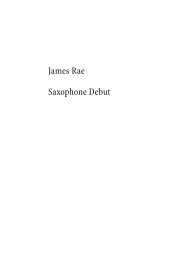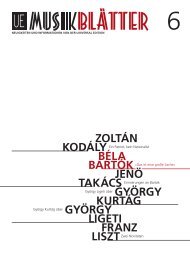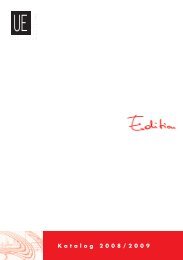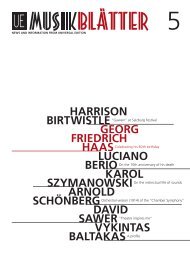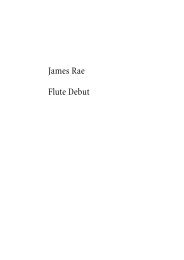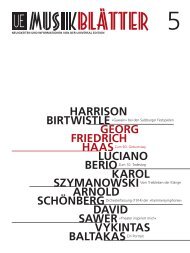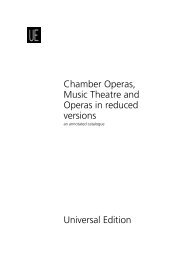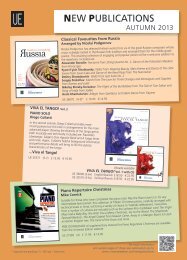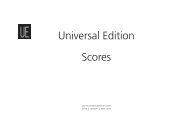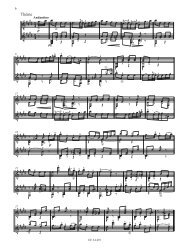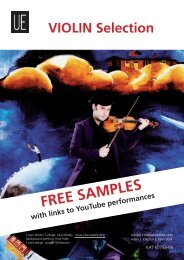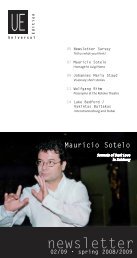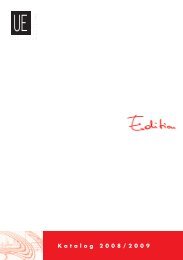Download a pdf of the UE newsletter. - Universal Edition
Download a pdf of the UE newsletter. - Universal Edition
Download a pdf of the UE newsletter. - Universal Edition
You also want an ePaper? Increase the reach of your titles
YUMPU automatically turns print PDFs into web optimized ePapers that Google loves.
07 Gustav Mahler<br />
As seen by Max Brod<br />
09 Jay Schwartz<br />
Narcissus & Echo at <strong>the</strong><br />
Munich Opera Festival<br />
11 Georg Friedrich Haas<br />
Summer’s Night at <strong>the</strong> Gewandhaus<br />
31 Karol Szymanowski<br />
In <strong>the</strong> limelight at <strong>the</strong><br />
Bregenz Festival<br />
33 Alban Berg<br />
New music for stage and concert<br />
Gustav Mahler<br />
New: Gustav Mahler Blog<br />
<strong>newsletter</strong><br />
03/09 • summer 2009
2<br />
Contents<br />
WP = World Première<br />
NEWS<br />
Survey results — 4<br />
New: Gustav Mahler Blog — 5<br />
Editors’ Report — 5<br />
COMPOSERS<br />
Mahler — 6<br />
Schwartz — 9<br />
Haas — 11<br />
Pousseur — 11<br />
Lentz — 12<br />
Luke Bedford — 12<br />
Rihm — 13<br />
Sawer — 14<br />
Boulez — 15<br />
Staud — 16<br />
Eichberg — 16<br />
Pärt — 17<br />
Furrer — 18<br />
Colla — 18<br />
Schnyder — 18<br />
Birtwistle — 19<br />
Kagel — 20<br />
Stockhausen — 20<br />
Berio — 21<br />
Ligeti — 22<br />
Feldman — 22<br />
Foerster — 23<br />
Webern / Pernes — 23<br />
Kuhmo Chamber<br />
Music Festival — 25<br />
Krenek — 26<br />
Schnittke — 26<br />
Weill / Brecht — 27<br />
Poot — 28<br />
Martin — 28<br />
Füssl — 29<br />
Hauer — 29<br />
Casella — 29<br />
Szymanowski — 31<br />
contents 03/2009
Bartók — 32<br />
Berg / Kloke — 33<br />
Schönberg — 34<br />
Rott — 34<br />
Schreker — 35<br />
Zemlinsky — 35<br />
Schmidt — 36<br />
Suk — 36<br />
Delius — 36<br />
Janáček — 37<br />
ANNIVERSARIES — 38 - 39<br />
WORLD PREMIÈRES — 40<br />
NEW RELEASES — 41 - 42<br />
NEW ON CD — 43 - 44<br />
WORKLIST<br />
Sotelo — 45<br />
ACKNOWLEDGEMENTS — 48<br />
Dear Readers,<br />
Music is hard work – and that’s good<br />
news. Musicians, ensembles, orchestras,<br />
composers and publishers are<br />
vibrant and creative links in a valuechain<br />
which contributes not just directly<br />
to our economies but also to<br />
our cultural and social well-being.<br />
In <strong>the</strong> 20 th century composers and<br />
publishers endured some <strong>of</strong> <strong>the</strong><br />
greatest crises imaginable. The spirit<br />
that moved our predecessors to<br />
continue to publish music in <strong>the</strong><br />
face <strong>of</strong> such difficulties lives on in us<br />
today. <strong>UE</strong> is now an international<br />
economic factor, with more than 70<br />
staff members in Austria, <strong>the</strong> UK<br />
and <strong>the</strong> USA; engravers in Austria,<br />
Poland, Hungary, Italy, France, Slovakia,<br />
Russia, <strong>the</strong> Czech Republic;<br />
printers in Austria and <strong>the</strong> Czech Republic;<br />
and a rich network <strong>of</strong> partners<br />
across <strong>the</strong> whole world.<br />
The value that this spirit creates is a<br />
long-standing cultural, artistic and<br />
social value. That is something to<br />
take great comfort in. Music is hard<br />
work, and <strong>the</strong> hard work is worth it.<br />
The Editorial Team<br />
3
4<br />
UNIVERSAL EDITION<br />
Survey results<br />
82% satisfaction<br />
Many thanks to <strong>the</strong> 350 readers<br />
who completed our <strong>newsletter</strong> survey<br />
– a healthy return for this kind<br />
<strong>of</strong> survey. Asked about your overall<br />
satisfaction with <strong>the</strong> <strong>newsletter</strong>,<br />
you gave us an average <strong>of</strong> 4.1 out <strong>of</strong><br />
5 points, corresponding to an approval<br />
rating <strong>of</strong> 82%. Thank you!<br />
That’s a gratifying figure, and it<br />
cheers us to know that <strong>the</strong> effort is<br />
worthwhile.<br />
Asked how <strong>of</strong>ten you read our<br />
<strong>newsletter</strong>, you gave us an encouraging<br />
score <strong>of</strong> 4.2 out <strong>of</strong> 5 (5 meaning<br />
always, 1 meaning never). The<br />
average reader reads more than<br />
half <strong>the</strong> whole <strong>newsletter</strong> (3.4 out<br />
<strong>of</strong> 5, 5 being everything). 85% <strong>of</strong><br />
you found information about composers<br />
and <strong>the</strong>ir works important,<br />
ahead <strong>of</strong> premières (72%) and <strong>UE</strong><br />
news (69%). That’s not really a<br />
huge surprise, but gives us confirmation<br />
<strong>of</strong> what is important.<br />
75% find <strong>the</strong> articles informative,<br />
and 62% are introduced to new<br />
composers or works. 91% <strong>of</strong> you<br />
find internet links useful, which<br />
sounds obvious <strong>the</strong>se days, but we<br />
weren’t really sure.<br />
3.4 out <strong>of</strong> a possible 5 for design<br />
and appearance is good, but shows<br />
us we need to think about improvements.<br />
Be assured that we<br />
will!<br />
news<br />
We received a wealth <strong>of</strong> constructive<br />
comments and suggestions,<br />
which have all been read by <strong>the</strong><br />
whole <strong>newsletter</strong> team. We will<br />
take <strong>the</strong>m all on board and endeavour<br />
to improve <strong>the</strong> quality <strong>of</strong><br />
<strong>the</strong> <strong>newsletter</strong> continuously.<br />
Thank you again to all those who<br />
participated. If you didn’t get<br />
around to doing so, or if you have<br />
any comments, questions or requests,<br />
you can contact us directly<br />
anytime at<br />
promotion@universaledition.com<br />
Remember that all our past<br />
<strong>newsletter</strong>s are online to browse,<br />
search, print and download at<br />
www.tinyurl.com/news-en<br />
If you don’t already receive our<br />
monthly e-mail <strong>newsletter</strong>, sign up<br />
here:<br />
www.universaledition.com/email<br />
news
UNIVERSAL EDITION<br />
New:<br />
Gustav Mahler<br />
Blog<br />
Exclusive video interviews with<br />
Pierre Boulez and Daniel Barenboim<br />
are just <strong>the</strong> first two to be<br />
published on our new Gustav<br />
Mahler blog at www.universal<br />
edition.com/mahler In <strong>the</strong> middle<br />
<strong>of</strong> <strong>the</strong> Berliner Staatskapelle’s concert<br />
series <strong>of</strong> Mahler symphonies,<br />
we asked both conductors to talk<br />
about <strong>the</strong>ir personal relationship<br />
with <strong>the</strong> music <strong>of</strong> Gustav Mahler.<br />
Interviews with a stunning list <strong>of</strong><br />
conductors will follow leading up<br />
to and during <strong>the</strong> anniversary<br />
years.<br />
The new blog is where we will be<br />
publishing all information regarding<br />
performances, festivals, interviews,<br />
new editions, recordings<br />
and reviews, and where we will be<br />
pointing to content about Gustav<br />
Mahler on <strong>the</strong> internet. If you are<br />
planning an activity related to Gustav<br />
Mahler in <strong>the</strong> anniversary years<br />
(or in <strong>the</strong> run up), let us know, and<br />
we will make sure it is published<br />
on <strong>the</strong> blog.<br />
www.universaledition.com/mahler<br />
UNIVERSAL EDITION<br />
Editors’ report<br />
In our last <strong>newsletter</strong> we announced<br />
<strong>the</strong> first ever publication<br />
<strong>of</strong> our editors’ report, giving an<br />
overview <strong>of</strong> <strong>the</strong> new scores created<br />
last year. The feedback we received<br />
was very generous. Here’s a reminder<br />
<strong>of</strong> <strong>the</strong> link:<br />
www.universaledition.com/editors<br />
report<br />
Gustav Mahler<br />
by Emil Orlik, 1902<br />
news<br />
5
6<br />
MAHLER<br />
The original<br />
romantic<br />
“When I first met him in Hamburg<br />
in <strong>the</strong> autumn <strong>of</strong> 1894, shortly<br />
after derisive criticism <strong>of</strong> his Symphony<br />
No. 1 had given me an ardent<br />
longing for <strong>the</strong> work and its creator,<br />
he seemed to me to be <strong>the</strong><br />
original romantic,” said Bruno Walter<br />
in 1956, remembering Gustav<br />
Mahler. Today it is hard to imagine<br />
that Mahler once needed promoting.<br />
This summer will again feature<br />
a wealth <strong>of</strong> Mahler performances:<br />
Symphony No. 1 can be heard<br />
under young Gustavo Dudamel<br />
(Orchestre Philharmonique de<br />
Radio France) in Paris on 26 Jun and<br />
under <strong>the</strong> eminent Claudio Abbado<br />
(12, 14–15 Aug, opening concert<br />
at <strong>the</strong> Lucerne Festival). On 21–22<br />
Aug, Abbado will also be presenting<br />
<strong>the</strong> Rückert-Lieder and Symphony<br />
No. 4 at <strong>the</strong> same venue.<br />
Both performances will have <strong>the</strong><br />
e<strong>the</strong>real Magdalena Kožená as<br />
soloist.<br />
The Vienna Philharmonic also has a<br />
musical treat in store with Symphony<br />
No. 4 on its Spanish tour,<br />
under principle conductor Fabio<br />
Luisi (2–7 Jun, soloist: Mojca Erdmann).<br />
Ingo Metzmacher will be touring<br />
Germany and Paris with Adagio<br />
from Symphony No. 10 (19–24 Jun).<br />
mahler<br />
Gustavo Dudamel<br />
Philippe Jordan is to conduct <strong>the</strong><br />
same piece with <strong>the</strong> Orchester der<br />
Deutschen Staatsoper (25–26 Jun)<br />
in Berlin.<br />
Steven Sloane will be incorporating<br />
Adagio into his Mahler cycle on 18<br />
Jun with <strong>the</strong> Bochumer Symphoniker.<br />
Manfred Honeck, <strong>the</strong> new music<br />
director in Pittsburgh, will be<br />
showcasing Symphony No. 2 <strong>the</strong>re<br />
(12–14 Jun). The work will also be<br />
performed at <strong>the</strong> Flughafenhalle in<br />
Cottbus under Evan Christ (5, 7<br />
Jun).
MAHLER<br />
Jewish melodies<br />
Excerpt from Die musikalischen<br />
Blätter des Anbruch, 2 nd edition,<br />
issue 10, May 1920, p. 378 f.:<br />
Gustav Mahler’s Jewish Melodies<br />
by Max Brod, Prague<br />
Since <strong>the</strong> Galician refugees came<br />
to Prague, I now <strong>of</strong>ten attend <strong>the</strong><br />
religious services <strong>of</strong> <strong>the</strong> eastern<br />
Jews – absolutely <strong>the</strong> most sublime<br />
events I have ever been privileged<br />
to experience. In particular, I<br />
can only recommend with <strong>the</strong><br />
deepest reverence <strong>the</strong> mystical<br />
“third meal” (schlosch sude) at <strong>the</strong><br />
end <strong>of</strong> <strong>the</strong> Sabbath, which a Hassidic<br />
rabbi permitted me to attend<br />
with his congregation several<br />
times. The enthralling holy<br />
melodies sound continuously,<br />
hummed by individuals, taken up<br />
by <strong>the</strong> choir, from <strong>the</strong> dark corners<br />
<strong>of</strong> <strong>the</strong> unlit suburban room, along<br />
<strong>the</strong> humble yet dignified table, in<br />
deep male voices and in a bright<br />
children’s descant … suddenly I understood.<br />
In a flash it was as if I had<br />
found <strong>the</strong> key (long-sought, to<br />
something that might seem remote,<br />
but was also deeply Jewish)<br />
to <strong>the</strong> art <strong>of</strong> Gustav Mahler. And, in<br />
particular, to one striking characteristic<br />
<strong>of</strong> his work, which has <strong>of</strong>ten<br />
been discussed and even criticised:<br />
to Mahler’s march rhythms, which<br />
he uses remarkably <strong>of</strong>ten. There<br />
have been a number <strong>of</strong> different<br />
interpretations <strong>of</strong> <strong>the</strong> composer’s<br />
particular fondness for marches,<br />
which mount up and expand in almost<br />
every symphony (for example,<br />
in <strong>the</strong> first movement <strong>of</strong> <strong>the</strong> I,<br />
III and VI, in <strong>the</strong> final movements<br />
<strong>of</strong> <strong>the</strong> II, VI and VII symphonies, or<br />
in <strong>the</strong> song “Revelge”). One biographer<br />
(I think it was Specht) affectionately<br />
attributes this partiality<br />
to <strong>the</strong> fact that <strong>the</strong> young Mahler<br />
grew up next to a barracks in Leibmeritz,<br />
where <strong>the</strong> trumpet commands<br />
Gustav Mahler<br />
mahler<br />
7
8<br />
CONT. P. 7<br />
Jewish meldodies<br />
and military rhythms sank into his<br />
consciousness. Less generous critics<br />
speak instead <strong>of</strong> banality and<br />
lack <strong>of</strong> ideas. And at every Mahler<br />
performance one can still see a few<br />
fans <strong>of</strong> “genteel” music wringing<br />
<strong>the</strong>ir hands, who might in <strong>the</strong><br />
same way fall upon <strong>the</strong> less subtle,<br />
but slicker formal talent <strong>of</strong> Richard<br />
Strauss: “oh, so crude, this eternal<br />
tran-ta-ra!”. O<strong>the</strong>rs see Mahler’s<br />
step-wise four-four time signature<br />
as an effort to write in <strong>the</strong> style <strong>of</strong><br />
German folk songs, an attempt at<br />
assimilation. – No! Since hearing<br />
<strong>the</strong> Hassidic folk songs, I believe<br />
that Mahler had to write in this<br />
way and no o<strong>the</strong>r, with his music<br />
springing from <strong>the</strong> same unconscious<br />
place in his Jewish soul as is<br />
<strong>the</strong> source <strong>of</strong> <strong>the</strong>se beautiful Hassidic<br />
songs, which he is unlikely<br />
ever to have heard. The strange<br />
thing is that <strong>the</strong>se songs <strong>of</strong>ten use<br />
sharply delineated march rhythms,<br />
even when <strong>the</strong> text speaks <strong>of</strong> <strong>the</strong><br />
most exalted things, <strong>of</strong> God and<br />
eternity. The gradual songs and<br />
psalms are also presented in this<br />
way. So <strong>the</strong>se marches are not<br />
banal, base, military, but seem to<br />
me to symbolise <strong>the</strong> determined,<br />
upright, happy gait <strong>of</strong> <strong>the</strong> fulfilled<br />
and godly soul. At <strong>the</strong> same time<br />
one sees <strong>the</strong> inestimable crowds <strong>of</strong><br />
<strong>the</strong> host <strong>of</strong> comrades in <strong>the</strong> name<br />
mahler<br />
<strong>of</strong> God approach. And can one not<br />
get <strong>the</strong> same impression from<br />
Mahler, when one listens closely?<br />
Doesn’t <strong>the</strong> splendid final movement<br />
<strong>of</strong> <strong>the</strong> II Symphony show <strong>the</strong><br />
endless armada <strong>of</strong> souls risen from<br />
<strong>the</strong> dead hurrying to <strong>the</strong> Jewish<br />
Last Judgement – expressed by<br />
Mahler in march-time? – Often, on<br />
<strong>the</strong> o<strong>the</strong>r hand, <strong>the</strong> quiet step-time<br />
represents quiet joy, as in <strong>the</strong> indescribably<br />
beautiful Sabbath hymn<br />
“Jißmechu bemalchusscho”. It<br />
seems that <strong>the</strong> Jewish listener has<br />
access to a great variety <strong>of</strong> different<br />
kinds <strong>of</strong> march, to express a<br />
great range <strong>of</strong> emotions. It is only<br />
to <strong>the</strong> non-Jew that this appears<br />
monotonous – <strong>the</strong> Jew can hear<br />
nuance. ...
SCHWARTZ<br />
Illusion and<br />
beauty<br />
There’s no real vanity or<br />
WP narcissism in Jay<br />
Schwartz’ chamber opera<br />
Narcissus & Echo, for countertenor,<br />
viola, percussion and organ, sung<br />
in <strong>the</strong> original Latin from Ovid’s<br />
Metamorphosis. Schwartz’ interpretation<br />
deals much more with<br />
<strong>the</strong> fact that Narcissus never<br />
recognised himself in <strong>the</strong> water,<br />
and fell in love with an illusion and<br />
above all with beauty itself. The musical<br />
instrumentation <strong>of</strong> counter-<br />
Jay Schwartz<br />
tenor and viola produces a duet <strong>of</strong><br />
both harmony and tension – two<br />
independent voices that never<strong>the</strong>less<br />
create a homogenous sound.<br />
The Bavarian State Opera has commissioned<br />
a new version <strong>of</strong> this<br />
work for <strong>the</strong> Munich Opera Festival<br />
2009. Christiane Pohle directs a<br />
performance designed by Raimund<br />
Orfeo Voigt. Charles Maxwell is <strong>the</strong><br />
countertenor, with Lila Brown on<br />
viola. The première is on 2 July at<br />
<strong>the</strong> Allerheiligen H<strong>of</strong>kirche in Munich.<br />
For more information, see <strong>the</strong><br />
Bavarian State Opera website:<br />
tinyurl.com/nandecho<br />
In Narcissus & Echo, Schwartz<br />
makes use <strong>of</strong> his “highly sensuous<br />
musical language”, as <strong>the</strong> earlier<br />
version <strong>of</strong> <strong>the</strong> work was described.<br />
On <strong>the</strong> world première <strong>of</strong> his earlier<br />
work, Music for Chamber Ensemble,<br />
in 2006, <strong>the</strong> Estonian composer<br />
and music critic Märt-Matis Lill<br />
wrote “In Jay Schwartz’ music we<br />
find a very successful syn<strong>the</strong>sis <strong>of</strong><br />
American and European traditions.<br />
In a sense, <strong>the</strong> way in which <strong>the</strong><br />
contrasting musical elements <strong>of</strong><br />
his works are united demonstrates<br />
<strong>the</strong> way America and Europe <strong>the</strong>mselves<br />
are united.”<br />
schwartz<br />
9
HAAS<br />
Dark side<br />
<strong>of</strong> <strong>the</strong> summer<br />
As well as commissioning<br />
WP Johannes Maria Staud<br />
(see Newsletter 2/2009),<br />
<strong>the</strong> Gewandhaus Orchestra has<br />
given Georg Friedrich Haas an assignment.<br />
The world première is<br />
set for 28 Aug under Riccardo<br />
Chailly. The title <strong>of</strong> <strong>the</strong> new piece,<br />
Traum in des Sommers Nacht, naturally<br />
makes a reference to Felix<br />
Mendelssohn-Bartholdy, while at<br />
<strong>the</strong> same time distancing itself<br />
from him. It targets <strong>the</strong> obvious<br />
difference between midsummer’s<br />
night and <strong>the</strong> summer’s night (i.e.<br />
its end) itself, while also referring<br />
to a constant element <strong>of</strong> Haas’<br />
work: night. Haas has written several<br />
works that are performed in<br />
total darkness – as a tribute to his<br />
love <strong>of</strong> obscurity and <strong>the</strong> resulting<br />
heightened awareness.<br />
At <strong>the</strong> opening concert <strong>of</strong> <strong>the</strong><br />
Wiener Festwochen in early May,<br />
Clemens Hagen played Haas’ microtonal<br />
cadence in Joseph Haydn’s<br />
Cello Concerto with <strong>the</strong> Vienna<br />
Philharmonic under Nikolaus<br />
Harnoncourt.<br />
Henri Pousseur<br />
POUSSEUR<br />
Henri Pousseur<br />
dies<br />
Festival and concert organisers,<br />
journalists and publicists all<br />
around <strong>the</strong> world were busy<br />
preparing tributes to Henri Pousseur<br />
for his 80 th birthday when his<br />
death was announced on 6 Mar<br />
2009. Dedicated to Pousseur this<br />
year, <strong>the</strong> Festival Ars Musica in<br />
Brussels became a memorial event<br />
in his honour, with his new book<br />
presented and many <strong>of</strong> his works<br />
performed.<br />
<strong>Universal</strong> <strong>Edition</strong> mourns a great,<br />
sophisticated composer who was a<br />
central figure in <strong>the</strong> development<br />
<strong>of</strong> modern music.<br />
haas / pousseur<br />
11
12<br />
LENTZ<br />
Pensées<br />
australiennes<br />
The new version <strong>of</strong><br />
WP Guyuhmgan for orchestra<br />
by Georges Lentz will<br />
be premiered on 2 July at <strong>the</strong> Philharmonie<br />
in Luxembourg. Emmanuel<br />
Krivine conducts <strong>the</strong> Orchestre<br />
philharmonique du Luxembourg.<br />
Lentz writes <strong>of</strong> <strong>the</strong> work,<br />
“Influences behind <strong>the</strong> composition<br />
<strong>of</strong> Guyuhmgan include my discovery<br />
<strong>of</strong> <strong>the</strong> works <strong>of</strong> Australian<br />
Aboriginal painter Kathleen Petyarre:<br />
her huge canvasses filled<br />
with innumerable tiny dots, which<br />
look a bit like a night sky, have<br />
made a great impression on me.<br />
The beginning <strong>of</strong> Guyuhmgan is a<br />
direct reflection <strong>of</strong> this.” Lentz has<br />
also quoted Blaise Pascal’s Pensées,<br />
with <strong>the</strong>ir thoughts on <strong>the</strong> smallness<br />
<strong>of</strong> man, as an influence. He<br />
continues: “The title Guyuhmgan<br />
(an Aboriginal word meaning<br />
“stars”) reflects my love <strong>of</strong> <strong>the</strong> vast<br />
empty space <strong>of</strong> <strong>the</strong> Australian<br />
landscape with its radiantly beautiful<br />
night skies.”<br />
LUKE BEDFORD<br />
New shores<br />
The music <strong>of</strong> Luke Bedford reaches<br />
new shores this summer as part <strong>of</strong><br />
<strong>the</strong> Tokyo Concerts Summer Festival.<br />
Despite previously working<br />
with <strong>the</strong> Tokyo Philharmonic, this<br />
marks <strong>the</strong> first concert performance<br />
<strong>of</strong> Bedford’s music in Japan.<br />
On 25 Aug, Ryusuke Numajiri will<br />
conduct <strong>the</strong> Tokyo Metropolitan SO<br />
in <strong>the</strong> Japanese première <strong>of</strong><br />
Wrea<strong>the</strong>. Bedford found himself<br />
attracted to <strong>the</strong> “slightly archaic,<br />
decaying quality [<strong>of</strong> <strong>the</strong> title] and<br />
also because it describes <strong>the</strong> way in<br />
which <strong>the</strong> ideas <strong>of</strong> <strong>the</strong> piece entwine<br />
each o<strong>the</strong>r.”<br />
Luke Bedford<br />
lentz / bedford
RIHM<br />
Wolfgang Rihm<br />
Sounds<br />
and forms<br />
Forms have a central role in Wolfgang<br />
Rihm’s work, as Form / 2 Formen,<br />
Gedrängte Form, Gejagte<br />
Form, Jagden und Formen and Verborgene<br />
Formen clearly show.<br />
Gejagte Form develops its flow<br />
from <strong>the</strong> basic contradiction implied<br />
in <strong>the</strong> descriptive title, which<br />
is mentioned by Rihm in his text<br />
for <strong>the</strong> world première: “An energy<br />
beyond form, but <strong>of</strong> <strong>the</strong> same<br />
essence, leads <strong>the</strong> music into formal<br />
arrangements, but, taken seriously<br />
as an element, drives it inevitably<br />
back out <strong>of</strong> <strong>the</strong>m again”.<br />
Ensemble Modern will be performing<br />
Gejagte Form on 8 Jun as part<br />
<strong>of</strong> <strong>the</strong> focus on Rihm in Essen. It<br />
will be conducted by Stefan Asbury.<br />
Form / 2 Formen is dedicated to<br />
Edgar Varèse. The instrumentation<br />
<strong>of</strong> his Déserts has been enhanced<br />
by a double bass, replacing <strong>the</strong><br />
piano and tape. Rihm clearly admires<br />
Varèse’s alchemy <strong>of</strong> sound. In<br />
this work, he builds on Varèse’s<br />
concepts <strong>of</strong> form with Varèse’s creative<br />
cycle becoming a spiral in<br />
Rihm’s work.<br />
Rihm’s sound productions are<br />
multi-layered, with <strong>the</strong> individual<br />
layers frequently moving in opposite<br />
directions. We experience <strong>the</strong><br />
tension and relaxation <strong>of</strong> <strong>the</strong> vertical<br />
dimension or tonal range (as in<br />
Varèse’s work), as well as <strong>of</strong> <strong>the</strong><br />
horizontal or time dimension. Ensemble<br />
Modern will be performing<br />
Form / 2 Formen at <strong>the</strong> Salzburg<br />
Festival on 11 Aug in a version for 20<br />
instrumentalists in 4 groups <strong>of</strong> 5<br />
musicians, under François-Xavier<br />
Roth.<br />
Ricercare for 14 instrumentalists,<br />
which received its world première<br />
in Turin/I in 1990, will be returning<br />
to Italy for a performance in Montepulciano<br />
on 24 Jul.<br />
rihm<br />
13
14<br />
SAWER<br />
Fresh tonality<br />
Commissioned by NMC<br />
WP as part <strong>of</strong> its Songbook<br />
project to celebrate 20<br />
years <strong>of</strong> innovative recordings <strong>of</strong><br />
contemporary British music, David<br />
Sawer’s The Source opens <strong>the</strong> collection<br />
<strong>of</strong> some 100 new works, all<br />
on <strong>the</strong> <strong>the</strong>me <strong>of</strong> “Britain”. Receiving<br />
its world première on 1 Apr, <strong>the</strong><br />
subtle interplay between two wellmatched<br />
voices (in this case Claire<br />
Booth, sop. and Susan Bickley,<br />
mezzo) contrasts with <strong>the</strong> vibrant<br />
ringing <strong>of</strong> tubular bells (Owen<br />
Gunnell) to create an unusual<br />
texture bursting with energy<br />
(CD box set available from<br />
www.nmcrec.co.uk, see p. 44).<br />
Shortly before this first performance,<br />
<strong>the</strong> Piano Concerto was heard<br />
again in Manchester (19 Mar),<br />
David Sawer Skin Deep Opera North Leeds 2009<br />
sawer<br />
when James MacMillan conducted<br />
<strong>the</strong> BBC Philharmonic and soloist<br />
Rolf Hind, for whom <strong>the</strong> work was<br />
composed in 2002.<br />
Later this year Skin Deep – Sawer’s<br />
satirical opera with a libretto by<br />
renowned satirist Armando Iannucci<br />
– will receive its Austrian première<br />
at <strong>the</strong> Bregenz Festival on 17<br />
Aug, before fur<strong>the</strong>r performances<br />
at <strong>the</strong> Royal Danish Opera in<br />
Copenhagen next spring (opening<br />
23 Apr 2010). “He commands a light<br />
touch, a terse rapidity, a witty<br />
scherzando manner that is Stravinskyan<br />
in its biting clarity, but aids<br />
him in emulating those masters <strong>of</strong><br />
comic texture Rossini and Offenbach,<br />
whom he cites as models for<br />
Skin Deep. Sawer uses tonality in a<br />
completely fresh way, while drawing<br />
freely on more acerbic, modernist<br />
sounds native to him.” (The<br />
Sunday Times)
Pierre Boulez<br />
BOULEZ<br />
Giving his all<br />
“In a disquieting way, it’s impossible<br />
to imagine <strong>the</strong> music world<br />
without Boulez. His age has a<br />
youthfulness. He gives his all.”<br />
(diary entry by Wolfgang Rihm,<br />
2000).<br />
Pierre Boulez will be giving his all<br />
this summer – whe<strong>the</strong>r working<br />
with top orchestras or on his friend<br />
Daniel Barenboim’s project, <strong>the</strong><br />
West-Eastern Divan Orchestra.<br />
In early June, he will be conducting<br />
his Notations I–IV and Notation VII<br />
(4–6 Jun) from <strong>the</strong> rostrum <strong>of</strong> <strong>the</strong><br />
Berlin Philharmonic. These brilliant<br />
orchestral works are based on<br />
Douze Notations for piano, written<br />
in 1945, and a stroke <strong>of</strong> genius by<br />
<strong>the</strong> young Boulez. He is also working<br />
to complete <strong>the</strong> cycle.<br />
Boulez can be experienced as a<br />
teacher at <strong>the</strong> Salzburg Festival: Le<br />
Marteau sans maître and Messagesquisse<br />
will be performed on<br />
16 Aug (West-Eastern Divan Orchestra).<br />
The Helsinki Festival will<br />
also be showcasing Boulez: ... explosante-fixe<br />
... for flute with live<br />
electronics, 2 flutes and ensemble<br />
and Dialogue de l'ombre double<br />
(13–14 Aug).<br />
The Tanglewood Festival <strong>of</strong> Contemporary<br />
Music will present <strong>the</strong><br />
US première <strong>of</strong> <strong>the</strong> solo piano piece<br />
une page d'éphéméride as well as a<br />
performance <strong>of</strong> Incises (11 Aug,<br />
soloist Nicolas Hodges). Thomas<br />
Zehetmair is to conduct Éclat in<br />
Gateshead/GB on 18 Jun (Nor<strong>the</strong>rn<br />
Sinfonia).<br />
boulez<br />
15
16<br />
STAUD<br />
Comparative<br />
meteorology<br />
Like Johannes Maria Staud’s last<br />
world première for <strong>the</strong> Gewandhaus<br />
Orchestra, his piece written<br />
for <strong>the</strong> Cleveland Orchestra was<br />
also inspired by Bruno Schulz’s<br />
(1892–1942) visionary collections <strong>of</strong><br />
short stories and graphic works. On<br />
Comparative Meteorology is influenced<br />
by his hypertrophic descriptions<br />
<strong>of</strong> nature and <strong>the</strong>ir idiosyncratic<br />
reflections within <strong>the</strong> human<br />
mind. However, it does not attempt<br />
to duplicate Schulz’s pictures<br />
(world première 28–30 May, Cleveland/USA).<br />
Chief conductor Franz<br />
Welser-Möst will be on <strong>the</strong> rostrum.<br />
The general high esteem in which<br />
Staud is held has brought him two<br />
awards: <strong>the</strong> Paul Hindemith Prize<br />
<strong>of</strong> <strong>the</strong> Schleswig-Holstein Music<br />
Festival (in conjunction with a<br />
Johannes Maria Staud<br />
portrait concert on 14 Aug with Ensemble<br />
Modern, which will include<br />
Incipit I). Staud is also being awarded<br />
<strong>the</strong> Emil Berlanda Prize <strong>of</strong><br />
Tyrol/A.<br />
EICHBERG<br />
The Inuit<br />
in ecstasy<br />
In his 11-minute violin concerto Qilaatersorneq,<br />
Søren Nils Eichberg<br />
followed <strong>the</strong> ritual drum dance <strong>of</strong><br />
Greenland’s original inhabitants:<br />
<strong>the</strong> Inuit. Beginning with an elegiac<br />
melody, <strong>the</strong> ritual develops<br />
into a rhythmic frenzy. The piece<br />
was awarded <strong>the</strong> Grand Prix de<br />
Composition in <strong>the</strong> Queen Elisabeth<br />
International Music Competition<br />
<strong>of</strong> Belgium in 2001. The Danish<br />
RSO performed <strong>the</strong> piece on 30<br />
May in Copenhagen under Thomas<br />
Dausgaard with Johannes Soe<br />
Hansen as soloist.<br />
staud / eichberg
Arvo Pärt<br />
PÄRT<br />
A summer <strong>of</strong><br />
string sounds<br />
A glance at Arvo Pärt’s work reveals<br />
his affinity with and love <strong>of</strong> <strong>the</strong> homogeneous<br />
sound <strong>of</strong> strings. Pärt’s<br />
Symphony No. 4 ‘Los Angeles’,<br />
which premièred this January, was<br />
written for string orchestra, harp,<br />
timpani and percussion. Some <strong>of</strong><br />
<strong>the</strong> works with which Pärt embarked<br />
on his new era <strong>of</strong> composition<br />
in 1976 (Tintinnabuli) and<br />
which are scored or were later<br />
arranged for string orchestra, have<br />
since become mainstays <strong>of</strong> international<br />
concert calendars: Tabula<br />
Rasa, Fratres, Summa and Cantus<br />
in Memory <strong>of</strong> Benjamin Britten.<br />
Christian Lindberg will be presenting<br />
<strong>the</strong> trombone, string orchestra<br />
and percussion version <strong>of</strong> Fratres in<br />
London (1 Jul), while Valery Giergiev<br />
is to conduct <strong>the</strong> London Symphony<br />
Orchestra performing Cantus in<br />
Memory <strong>of</strong> Benjamin Britten in St.<br />
Paul’s Ca<strong>the</strong>dral in London (9 Jul).<br />
Darf ich … for violin and strings<br />
was written for Yehudi Menuhin<br />
and will be played by Daniel Hope<br />
in Gstaad/CH (25 Jul) at <strong>the</strong><br />
Menuhin Festival, where <strong>the</strong> piece<br />
received its world première.<br />
Silouans Song for string orchestra<br />
will feature in three performances<br />
by <strong>the</strong> Nederlands Strijkers Gilde:<br />
in Groningen (10 Jul), Delft (11 Jul)<br />
and Amsterdam (12 Jul).<br />
A very special event will be taking<br />
place in Tallinn/EST in July. The Estonian<br />
Song Festival is set to attract<br />
some 20,000 choral singers<br />
to Tallinn. Credo for piano, mixed<br />
choir and orchestra will be performed<br />
at <strong>the</strong> opening concert (4<br />
Jul) by <strong>the</strong> Estonian National Symphony<br />
Orchestra under Eri Klas.<br />
pärt<br />
17
18<br />
FURRER<br />
Sounds <strong>of</strong> noise<br />
Beat Furrer’s ensemble piece<br />
Gaspra (1988) is named after a five<br />
kilometre-wide asteroid which<br />
wanders <strong>the</strong> gravitational fields <strong>of</strong><br />
our solar system. The seven instruments<br />
– flute, clarinet, percussion,<br />
piano, violin, viola and cello – are<br />
formed into smaller groups within<br />
<strong>the</strong> ensemble. This is <strong>the</strong> first work<br />
in which <strong>the</strong> composer used nonmusical<br />
noise and worked with<br />
rhythmic patterns which undergo a<br />
transformation from <strong>the</strong>ir initial<br />
constellation to reach a pre-determined<br />
final configuration. The<br />
emex ensemble presents <strong>the</strong> work<br />
at <strong>the</strong> Philharmonie in Essen (3<br />
Jun).<br />
COLLA (BORN IN 1963)<br />
Arabian rhythms<br />
The Italian composer Alberto Colla<br />
uses mainly Arabian scales and<br />
rhythms, primarily from Egyptian<br />
music, in his orchestral work Le<br />
rovine di Palmira (The Ruins <strong>of</strong><br />
Palmyra) (1999). The composition is<br />
based on <strong>the</strong> same Arabian tale as<br />
Rimsky-Korsakov’s 2 nd Symphony<br />
‘Antar’. In <strong>the</strong> piece, Colla unites<br />
various styles and quotations,<br />
familiarising listeners with, or<br />
reminding <strong>the</strong>m <strong>of</strong>, <strong>the</strong> experiences<br />
<strong>of</strong> past generations <strong>of</strong> composers.<br />
The St. Louis SO performed<br />
<strong>the</strong> piece in St. Louis/USA under<br />
David Robertson (20 Mar).<br />
SCHNYDER<br />
Out <strong>of</strong> Africa<br />
The Summer Festival in<br />
Grafenegg/A begins on 11 Jul with<br />
<strong>the</strong> <strong>the</strong>me <strong>of</strong> “Out <strong>of</strong> Africa”, when<br />
<strong>the</strong> futuristic cloud structure <strong>of</strong> <strong>the</strong><br />
newly built open-air stage in <strong>the</strong><br />
park <strong>of</strong> Grafenegg Castle hosts<br />
music from <strong>the</strong> African continent.<br />
Kristjan Järvi and his Tonkünstler<br />
Orchester will also play three<br />
works from Abdullah Ibrahim’s<br />
Symphonic Encounters with South<br />
Africa (Blanton, Ishmael and<br />
Tsakawe) in an arrangement for<br />
orchestra by Daniel Schnyder.<br />
More Information:<br />
www.grafenegg.at<br />
furrer / colla /<br />
schnyder
Harrison Birtwistle<br />
BIRTWISTLE<br />
Happy Birthday<br />
Harry<br />
Following <strong>the</strong> spring celebrations<br />
we mentioned last time, <strong>the</strong> 75 th<br />
birthday concerts for Harrison<br />
Birtwistle are now in full swing.<br />
Both Bath and Aldeburgh festival<br />
are presenting <strong>the</strong> newly restored<br />
and re-mastered Chronometer in<br />
all <strong>of</strong> its four-channel glory.<br />
Two full days <strong>of</strong> birthday celebrations<br />
at Bath (31 May, 1 Jun) dedicated<br />
to <strong>the</strong> composer see a rare<br />
performance <strong>of</strong> For O, for O, <strong>the</strong><br />
Hobby-Horse is Forgot for 6 percussion<br />
players presented alongside a<br />
wealth <strong>of</strong> <strong>the</strong> smaller chamber<br />
works.<br />
Aldeburgh marks <strong>the</strong> occasion<br />
across a series <strong>of</strong> concerts, <strong>the</strong> first<br />
<strong>of</strong> which observes <strong>the</strong> opening <strong>of</strong><br />
<strong>the</strong> new H<strong>of</strong>fmann Building on<br />
13 Jun, featuring performances <strong>of</strong><br />
Chronometer and György Ligeti’s<br />
Poème Symphonique for 100<br />
metronomes. Later concerts include:<br />
An Imaginary Landscape (15<br />
Jun), Interludes from The Mask <strong>of</strong><br />
Orpheus (17 June), Cortege and<br />
Secret Theatre (22 Jun).<br />
Looking fur<strong>the</strong>r ahead, <strong>the</strong> 2009<br />
BBC Proms season begins just two<br />
days after Birtwistle’s 75 th and<br />
<strong>the</strong>re are a number <strong>of</strong> celebratory<br />
concerts to support <strong>the</strong> occasion.<br />
On 4 Aug (Prom 27), <strong>the</strong> London<br />
Sinfonietta are joined by <strong>the</strong>ir<br />
founder-conductor David A<strong>the</strong>rton<br />
to give a birthday concert, including<br />
Birtwistle’s earliest Sinfonietta<br />
commissions, Verses for Ensembles<br />
and Carmen arcadiae mechanicae<br />
perpetuum and Silbury Air will also<br />
feature in this late-night concert <strong>of</strong><br />
his major early works.<br />
On 14 Aug (Prom 39), Martyn Brabbins<br />
and Ryan Wigglesworth take<br />
control <strong>of</strong> <strong>the</strong> BBC SO and BBC<br />
Singers, leading a performance <strong>of</strong><br />
Birtwistle’s gargantuan opera The<br />
Mask <strong>of</strong> Orpheus. The central act<br />
will be presented, complete with a<br />
newly digitally re-mastered version<br />
<strong>of</strong> <strong>the</strong> electronic material.<br />
birtwistle<br />
19
20<br />
KAGEL<br />
Musical knitting<br />
needles<br />
Using an impressive variety <strong>of</strong> approaches<br />
and methods, Mauricio<br />
Kagel creatively explored what an<br />
instrument can be. An early phase<br />
gave rise to works which could be<br />
placed under <strong>the</strong> heading <strong>of</strong> “Instrumental<br />
Theatre” – pieces which<br />
used different non-musical objects,<br />
alongside conventional and<br />
exotic instruments. His String<br />
Quartets I and II (1965/67) use<br />
matches, knitting needles, lea<strong>the</strong>r<br />
gloves, wooden poles and coins, to<br />
name but a few. The Quatuor<br />
Bozzini perform <strong>the</strong> works on 5 and<br />
6 Jun in Montréal/CDN.<br />
STOCKHAUSEN<br />
Time and space<br />
At this year’s Stockhausen courses<br />
in Kurten/D, <strong>the</strong> music <strong>of</strong> Karlheinz<br />
Stockhausen will be presented<br />
across a total <strong>of</strong> 17 concerts. Works<br />
will include Telemusik (1966) for<br />
electronics, which lines up 32 structures,<br />
one after ano<strong>the</strong>r, without<br />
breaks. Stockhausen introduces<br />
elements <strong>of</strong> different cultures,<br />
which he extracts from <strong>the</strong>ir contexts<br />
and builds seamlessly into<br />
Susanna Mälkki<br />
<strong>the</strong> electronic composition.<br />
Gruppen (1955/57), one <strong>of</strong> his<br />
ground-breaking pieces, will be<br />
performed in Tokyo on 31 Aug by<br />
<strong>the</strong> NHK SO under Susanna Mälkki,<br />
Clement Power and Pablo Heras<br />
Casado: three separate orchestras<br />
each play independently <strong>of</strong> each<br />
o<strong>the</strong>r under three different conductors.<br />
The three orchestras are<br />
situated in a semi-circle around<br />
<strong>the</strong> listeners. Stockhausen communicates<br />
here for <strong>the</strong> first time <strong>the</strong><br />
conception <strong>of</strong> sound in <strong>the</strong> space<br />
using <strong>the</strong> large symphonic structure.<br />
The changing tempi allow<br />
multiple time periods to be experienced<br />
at once, built toge<strong>the</strong>r to<br />
form a new, unified time and<br />
space.<br />
.<br />
kagel / stockhausen
BERIO<br />
Berio in Paris<br />
This June sees three <strong>of</strong> Luciano<br />
Berio’s key works being performed<br />
in concert in Paris: Passaggio, Coro<br />
and Formazioni. Passaggio (for soprano,<br />
two choirs and instruments)<br />
caused a scandal when it premièred<br />
at <strong>the</strong> Piccola Scala in 1963.<br />
“I knew <strong>the</strong> audience would lose<br />
<strong>the</strong>ir heads so I briefed <strong>the</strong> choir<br />
accordingly. I told <strong>the</strong> choir that<br />
<strong>the</strong>y should join in as soon as <strong>the</strong><br />
audience starts shouting, echo <strong>the</strong><br />
last word and improvise on it. And<br />
that’s exactly what happened.<br />
Some people shouted “Buffoni”.<br />
The choir echoed <strong>the</strong> word immediately,<br />
sped it up, whispered it,<br />
leng<strong>the</strong>ned <strong>the</strong> “o” and turned <strong>the</strong><br />
improvisation into part <strong>of</strong> <strong>the</strong> performance.<br />
The audience became<br />
completely hysterical because <strong>the</strong>y<br />
had lost <strong>the</strong>ir chance to protest.”<br />
Passaggio can be heard at <strong>the</strong> Biennale<br />
d’Art Vocal in <strong>the</strong> Cité de la<br />
Musique on 9 Jun. Susanna Mälkki<br />
will be conducting Ensemble Intercontemporain<br />
with Julia Henning<br />
as soloist.<br />
In Coro (for choir and orchestra),<br />
highly varied folk techniques and<br />
gestures <strong>of</strong> sound are combined in<br />
places without referring to any<br />
specific folk songs. Coro can be<br />
heard on 13 Jun, performed by <strong>the</strong><br />
Vlaams Radio Orkest & Koor under<br />
Michel Tabachnik. In Formazioni,<br />
Berio questions “conventional” orchestral<br />
arrangement by using a<br />
special configuration <strong>of</strong> instruments,<br />
creating entirely new “formations”<br />
<strong>of</strong> orchestral sounds.<br />
Jean Deroyer will be conducting<br />
<strong>the</strong> Orchestre de Paris on 11 Jun at<br />
<strong>the</strong> Salle Pleyel.<br />
Luciano Berio<br />
berio<br />
21
22<br />
LIGETI<br />
Historic success<br />
The world première <strong>of</strong> Atmosphères<br />
in 1961 brought György Ligeti fame<br />
almost overnight. From a compositional<br />
viewpoint, he realised an<br />
idea that he had already had in<br />
mind in Hungary: dazzling, static<br />
music that moves within itself and<br />
avoids traditional categories, such<br />
as melody and metre, completely.<br />
Jonathan Nott, an accomplished<br />
advocate <strong>of</strong> modernity, will be conducting<br />
Atmosphères on 30 Aug at<br />
Festival Grafenegg/A with <strong>the</strong><br />
Gustav Mahler Jugendorchester.<br />
Wolkenturm Grafenegg/A<br />
FELDMAN<br />
Personal<br />
connections<br />
Morton Feldman’s artistic thinking<br />
was greatly influenced by John<br />
Cage. It was at his New York house<br />
on Grand Street that Feldman met<br />
many <strong>of</strong> <strong>the</strong> artists who would<br />
later become extraordinarily important<br />
to his work, notably Philip<br />
Guston and also Mark Rothko,<br />
whose 14 pictures in a Houston<br />
chapel moved Feldman deeply, inspiring<br />
him to write Rothko<br />
Chapel. Personal connections play<br />
an important role in <strong>the</strong> work, Feldman<br />
writing <strong>the</strong> soprano melody<br />
on <strong>the</strong> day <strong>of</strong> Igor Stravinsky’s<br />
funeral service in New York, for instance.<br />
Rothko Chapel (1971) for soprano,<br />
alto, mixed choir and instruments<br />
will be performed at <strong>the</strong><br />
Salzburger Festspiele on 7 Aug<br />
with Sylvain Cambreling conducting<br />
Klangforum Wien.<br />
Crippled Symmetry for flute, percussion<br />
and piano (and also celeste),<br />
which was written 12 years<br />
later, will be performed on 28 Aug<br />
in San Sebastian/E with ensemble<br />
recherche.<br />
ligeti / feldman
Josef Bohuslav Foerster<br />
FOERSTER<br />
Great<br />
spiritual power<br />
Josef Bohuslav Foerster<br />
(1859–1951), a contemporary <strong>of</strong><br />
Janácek, was a composer who embodied<br />
a great spiritual power, as<br />
well as a vast mental and emotional<br />
range. His Concerto for violin and<br />
orchestra Op. 88 (1910–11) resembles<br />
an extended symphonic poem<br />
with solo violin. Foerster stuck<br />
largely to <strong>the</strong> sound language <strong>of</strong><br />
<strong>the</strong> late romantic era, and while<br />
<strong>the</strong> solo part here is clearly integrated<br />
into <strong>the</strong> orchestra, <strong>the</strong>re is a<br />
distinct use <strong>of</strong> solo orchestral in-<br />
struments which constantly gives<br />
rise to new musical dialogues.<br />
Dirkjan Horringa and La Pellegrina<br />
will be performing this spiritual<br />
work on 1 Aug in Bechyne Castle in<br />
<strong>the</strong> Czech Republic.<br />
WEBERN / PERNES<br />
Edited songs<br />
Represented by several works in<br />
<strong>the</strong> <strong>UE</strong> catalogue and a composer<br />
in his own right, Thomas Pernes<br />
has edited Anton Webern’s Vier<br />
Lieder für Gesang und Klavier Op. 12<br />
(1915–17) for soprano and chamber<br />
ensemble (2008/09), <strong>of</strong>fering a<br />
new perspective on <strong>the</strong>se rare<br />
miniatures. Performance material<br />
is available now.<br />
On <strong>the</strong> subject <strong>of</strong> adaptations,<br />
Nikolaus Harnoncourt will be taking<br />
on Webern’s edition <strong>of</strong> Schubert’s<br />
Deutsche Tänze this summer.<br />
Opening <strong>the</strong> first concert <strong>of</strong> <strong>the</strong><br />
Salzburger Festspiele, he will conduct<br />
<strong>the</strong> Wiener Philharmoniker on<br />
26 and 28 Jul. Salzburg will also<br />
witness some first-class chamber<br />
music on 9 Aug: Mark Steinberg<br />
(vln) and Mitsuko Uchida (pno) are<br />
to perform Vier Stücke, while<br />
Clemens Hagen and Uchida will play<br />
Drei kleine Stücke. Passacaglia has<br />
aroused <strong>the</strong> interest <strong>of</strong> Christoph<br />
von Dohnányi, who will conduct<br />
Webern’s Op.1 on 14 and 15 Jun in<br />
Hamburg/D (NDR-Orchestra).<br />
foerster / webern<br />
23
KUHMO FESTIVAL<br />
<strong>UE</strong> in Kuhmo<br />
The Kuhmo Chamber Music Festival,<br />
<strong>the</strong> largest in Finland, takes place<br />
for <strong>the</strong> 40 th time this summer, presenting<br />
around 300 works in over<br />
70 concerts from 12–25 Jul. The<br />
main <strong>the</strong>me this year is “fairytales<br />
and stories”, and <strong>the</strong> festival will<br />
also be making a journey following<br />
<strong>the</strong> path <strong>of</strong> <strong>the</strong> Orient Express,<br />
from London all <strong>the</strong> way eastwards<br />
until it finally reaches New York.<br />
The Kuhmo journey also makes an<br />
extended stop in Vienna, and <strong>UE</strong><br />
composers are well represented<br />
during <strong>the</strong> course <strong>of</strong> <strong>the</strong> concerts.<br />
Anton Webern is honoured with a<br />
concert on 18 Jul, with performances<br />
<strong>of</strong> his Drei Kleine Stücke Op. 11. for<br />
cello and piano, his Four Pieces for<br />
violin and piano Op. 7 and <strong>the</strong> Six<br />
Bagatelles Op. 9 for string quartet.<br />
Kuhmo/FIN<br />
On 19 July <strong>the</strong> ‘secret voice’ in Alban<br />
Berg’s Lyric Suite can be heard,<br />
sung by <strong>the</strong> soprano Salome Haller<br />
with <strong>the</strong> Enescu Quartet. Berg hid<br />
references to both himself and to<br />
<strong>the</strong> secret subject <strong>of</strong> his desires,<br />
Hanna-Fuchs Robettin, in <strong>the</strong> work.<br />
See our edition <strong>UE</strong> 70017 edited by<br />
George Perle for more details. Four<br />
songs from Gustav Mahler’s Des<br />
Knaben Wunderhorn are also performed<br />
in <strong>the</strong> same concerts, with<br />
Jussi Myllys accompanied by<br />
Valeria Resjan.<br />
In addition to works by Webern,<br />
Schönberg, Mahler and Berg,<br />
lesser-known music by Karol Szymanowski<br />
(La Berceuse d’Aitacho<br />
Enia for violin and piano) and<br />
Erwin Schulh<strong>of</strong>f (Concertino) can<br />
also be heard. For a full list <strong>of</strong> concerts,<br />
see www.kuhm<strong>of</strong>estival.fi<br />
kuhmo festival<br />
25
26<br />
KRENEK<br />
Scenes from<br />
<strong>the</strong> West<br />
In <strong>the</strong> 1950s, Ernst Krenek composed<br />
several works for young audiences,<br />
such as his ‘four impressions<br />
for orchestra’ Scenes from <strong>the</strong> West<br />
Op. 134 which were written between<br />
1952 and 1953. These have<br />
been newly included in <strong>the</strong> <strong>UE</strong> catalogue<br />
and re-printed – orchestral<br />
material is available now.<br />
His piano song Die Nachtigall Op. 68<br />
is based on a poem by Karl Kraus.<br />
Krenek also arranged <strong>the</strong> work for<br />
coloratura soprano and ensemble<br />
<strong>the</strong> same year in which he composed<br />
it (1931). The latest performances<br />
are planned for 3–5 Jul in <strong>the</strong><br />
Gasteig, Munich/D. Musicians from<br />
<strong>the</strong> Münchner Philharmoniker will<br />
be performing under Michael<br />
Tilson-Thomas, with Laura Claycomb<br />
as soloist. Krenek’s song cycle<br />
Reisebuch aus den österreichischen<br />
Alpen can be heard on 28 Jul at <strong>the</strong><br />
Sommerliche Musiktage festival in<br />
Hitzacker/D with Jan Kobow as vocalist,<br />
accompanied by Burkhard<br />
Kehring at <strong>the</strong> piano.<br />
SCHNITTKE<br />
Hans Heinsheimer (<strong>UE</strong>), Gladys and Ernst Krenek<br />
Juggler <strong>of</strong> styles<br />
In his Faust cantata “Seid nüchtern<br />
und wachet ...”, Alfred Schnittke<br />
proves himself to be a virtuoso juggler<br />
<strong>of</strong> musical styles, but also no<br />
stranger to irony. Faust’s unpleasant<br />
end is highlighted by a bizarre<br />
sound effect paired with an exhilarating<br />
tango. Schnittke, however, always<br />
addresses his listeners directly<br />
on an emotional level. His Faust<br />
opera evolved from <strong>the</strong> cantata and<br />
<strong>the</strong>refore has considerable parallels<br />
with it. The cantata will be performed<br />
three times in Munich/D.<br />
Andrey Boreyko leads <strong>the</strong> Münchner<br />
Philharmoniker with soloist Marjana<br />
Prudenskaja (5–7 Jun).<br />
krenek / schnittke
WEILL / BRECHT<br />
Bob Wilson’s<br />
Threepenny Opera<br />
Theatre-maker Robert Wilson delighted<br />
<strong>the</strong> international press and<br />
Berlin audiences in 2007 with his<br />
idiosyncratic production <strong>of</strong> The<br />
Threepenny Opera (Kurt Weill /<br />
Bertolt Brecht). The dense, visual<br />
production, supported by <strong>the</strong> ensemble’s<br />
unbeatable acting, made<br />
for a unique aes<strong>the</strong>tic experience.<br />
Founded by Bertolt Brecht and Helene<br />
Weigl in 1949, <strong>the</strong> Berliner Ensemble<br />
chose to celebrate <strong>the</strong> 80th<br />
anniversary <strong>of</strong> The Threepenny<br />
Opera with this production. The<br />
Bergen International Festival has<br />
now invited <strong>the</strong> show to give a<br />
guest performance in Norway. Four<br />
performances are scheduled between<br />
30 May and 2 Jun.<br />
H.K. Gruber and Klangforum Wien<br />
will be heading <strong>of</strong>f on tour in June<br />
with a concert version <strong>of</strong> The<br />
Threepenny Opera. The star-studded<br />
cast features Ian Bostridge as<br />
Macheath, H. K. Gruber as<br />
Peachum, Hannah Schwarz as Mrs.<br />
Peachum, Doro<strong>the</strong>a Röschmann as<br />
Polly, Angelika Kirchschlager as<br />
Jenny and Florian Boesch as Tiger<br />
Brown. The tour kicks <strong>of</strong>f on 11 Jun<br />
in Hamburg before heading to<br />
London, Paris and Vienna.<br />
Kurt Weill The Threepenny Opera<br />
Berliner Ensemble 2007<br />
The critical edition <strong>of</strong> The Threepenny<br />
Opera has now been published<br />
in <strong>UE</strong>’s new study score series.<br />
As well as providing a detailed<br />
introduction to <strong>the</strong> work, this contains<br />
a wealth <strong>of</strong> directions for performance,<br />
<strong>the</strong> interludes and all <strong>of</strong><br />
<strong>the</strong> spoken text. The study score <strong>UE</strong><br />
34304 is available from music<br />
stores and from <strong>the</strong> <strong>UE</strong> web shop:<br />
www.universaledition.com<br />
weill / brecht<br />
27
28<br />
MARCEL POOT (1901–1988)<br />
„one hit wonder“<br />
The orchestral works <strong>of</strong> Belgian<br />
composer Marcel Poot are probably<br />
<strong>the</strong> strongest works in his oeuvre.<br />
His greatest success was his short<br />
piece Ouverure Joyeuse (1934) for<br />
orchestra, which ra<strong>the</strong>r put <strong>the</strong> rest<br />
<strong>of</strong> his compositions in <strong>the</strong> shade<br />
and marked him out as a “one hit<br />
wonder”. The recipe for this hit is<br />
intriguing none<strong>the</strong>less: rapid alternation<br />
between ebullient passages<br />
with a vital motricity and lyrical<br />
moments. The piece was last performed<br />
in Maastricht/NL on 29 Mar.<br />
MARTIN<br />
Austrian<br />
Monologues<br />
Thomas Quasth<strong>of</strong>f sings <strong>the</strong> music<br />
<strong>of</strong> Frank Martin this summer, with<br />
a performance <strong>of</strong> 6 Monologe aus<br />
Jedermann at <strong>the</strong> Salzburg Festival<br />
on 18 Aug, accompanied by Lars<br />
Vogt (and again at <strong>the</strong> Lucernce<br />
Festival on 20 Aug). The monologues<br />
have, as <strong>the</strong> baritone Dietrich<br />
Henschel puts it, “a broad<br />
palette <strong>of</strong> expressive values, ranging<br />
from drastic expressionism to<br />
lyric intimacy.”<br />
poot / martin<br />
The Staatsorchester Stuttgart performs<br />
<strong>the</strong> orchestral version <strong>of</strong> <strong>the</strong><br />
Monologe in Stuttgart (12 & 13 July,<br />
Christian Gerhaher, bar., Manfred<br />
Honeck) and Schwäbisch Gmünd<br />
(18 July, Konrad Jarnot, bar., Timo<br />
Handschuh).<br />
Martin’s Concerto for 7 wind instruments,<br />
timpani, percussion and<br />
strings from 1949 will be performed<br />
three times this summer<br />
by <strong>the</strong> Vienna Philharmonic conducted<br />
by Seiji Ozawa (22 June,<br />
Théâtre des Champs-Elysées, Paris;<br />
19 June, Musikverein Vienna;<br />
21 June, Konzerthaus Vienna).<br />
Frank Martin
KARL HEINZ FÜSSL (1924–1992)<br />
Emotional<br />
spontaneity<br />
The Carinthian Summer,<br />
Carinthia’s biggest music festival,<br />
celebrates its 40 th anniversary in<br />
2009. The anniversary programme<br />
features Bilder der Jahreszeit by<br />
Austrian composer Karl Heinz<br />
Füssl, whose creativity is mainly<br />
directed towards a freely handled<br />
dodecaphony. This is characterised<br />
by <strong>the</strong> emotional spontaneity<br />
which continually springs from his<br />
works, despite <strong>the</strong>ir structural<br />
rigour. Füssl himself: “<strong>the</strong> things<br />
that become fashionable regularly<br />
provoke me to violent counter-reaction.”<br />
His four songs for high<br />
voice and string orchestra adapted<br />
from Hölderlin is performed by <strong>the</strong><br />
Ensemble Kreativ under Guido<br />
Mancusi with soloist Ursula Langmayr<br />
on <strong>the</strong> 21 Jul in Ossiach/A.<br />
JOSEF M. HA<strong>UE</strong>R (1883–1959)<br />
Schönberg’s<br />
rival king<br />
Josef Matthias Hauer is one <strong>of</strong> those<br />
composers who was never really<br />
understood by his contemporaries.<br />
His reputation has been affected<br />
by his bitter fight to be recognised<br />
as “originator and (despite many<br />
poor imitations!) unfortunately<br />
still <strong>the</strong> only connoisseur and master<br />
<strong>of</strong> twelve-tone music”. He even<br />
became really aggressive towards<br />
his rival Arnold Schönberg when<br />
<strong>the</strong> question <strong>of</strong> <strong>the</strong> origins <strong>of</strong><br />
twelve-tone music arose. Today,<br />
this rivalry seems absurd, as <strong>the</strong><br />
two different methods <strong>of</strong> composition<br />
cannot be reduced to a single<br />
definition. The Ensemble Kreativ<br />
performs Hauer’s Kammermusik<br />
[Chamber Music] on <strong>the</strong> 20 July, also<br />
as part <strong>of</strong> <strong>the</strong> Carinthian Summer.<br />
ALFREDO CASELLA (1883–1947)<br />
Harmonic meeting<br />
point<br />
Alfredo Casella’s Scarlattiana (1926)<br />
is a divertimento for piano and 32<br />
instruments based on 88 <strong>the</strong>mes<br />
from 545 piano sonatas by<br />
Domenico Scarlatti. Casella wrote<br />
in his memoirs, “it is absolutely<br />
possible to find a harmonic meeting<br />
point between <strong>the</strong> 18 th and<br />
20 th centuries”. Working with Scarlatti’s<br />
ideas, Casella managed to<br />
fuse <strong>the</strong> two composers’ personalities<br />
into one ano<strong>the</strong>r and turn<br />
<strong>the</strong>m into a style, “led by internal<br />
impulses”. The Orquesta Filarmónica<br />
de Gran Canaria will enchant audiences<br />
with this work on 8 May in<br />
<strong>the</strong> Auditorio Alfredo Kraus in Las<br />
Palmas de Gran Canaria/E, under<br />
<strong>the</strong> direction <strong>of</strong> Christian Arming with<br />
Andrea Lucchesini at <strong>the</strong> piano.<br />
29<br />
füssl / hauer /<br />
casella
SZYMANOWSKI<br />
King Roger<br />
“He was a real genius,” says Polish<br />
pianist Pjotr Anderszewski, summing<br />
up <strong>the</strong> reverence for his countryman<br />
Karol Szymanowski.<br />
Three celebrated new productions<br />
<strong>of</strong> his opera King Roger stand as a<br />
reminder <strong>of</strong> Szymanowski’s genuine<br />
understanding <strong>of</strong> <strong>the</strong>atre.<br />
The Paris Opera is to stage King<br />
Roger on 18 June as <strong>the</strong> final première<br />
<strong>of</strong> <strong>the</strong> Mortier era. It will be<br />
directed by young Polish star<br />
Krzyszt<strong>of</strong> Warlikowski and conducted<br />
by Kazushi Ono (until 2 July).<br />
The Bregenz Festival will be showcasing<br />
Szymanowski’s only opera<br />
in a production by artistic director<br />
David Pountney (23, 26 July, 1, 3 Aug)<br />
with Mark Elder conducting.<br />
www.bregenzerfestspiele.com<br />
The Oper Bonn also has König<br />
Roger in its concert calendar (5,<br />
14 and 24 June, conductor: Stefan<br />
Blunier).<br />
Some remarkable concerts can be<br />
heard as part <strong>of</strong> <strong>the</strong> focus on Szymanowski<br />
in Bregenz: Paul Daniel<br />
is to conduct <strong>the</strong> Symphony No. 3<br />
and Stabat Mater (27 July, Wiener<br />
Symphoniker) and Gérard Korsten<br />
<strong>the</strong> Violin Concerto No. 1 (soloist:<br />
Patricia Kopatchinskaja).<br />
Christian Tetzlaff will also be performing<br />
<strong>the</strong> same piece in Vienna<br />
under Pierre Boulez with <strong>the</strong> Wiener<br />
Philharmoniker (12 June).<br />
La Berceuse d'Aitacho Enia for violin<br />
and piano can be heard on 20<br />
July at <strong>the</strong> Kuhmo Chamber Music<br />
Festival/FIN. My<strong>the</strong>s (also for violin<br />
and piano) will be performed in<br />
Schwetzingen/D on 5 June. The<br />
Concert Overture can be heard in<br />
Munich/D. Vladimir Fedoseyev will<br />
conduct <strong>the</strong> BR-Orchester (25–26,<br />
28 June). Stabat Mater receives a<br />
second outing at <strong>the</strong> London BBC<br />
Proms (Aug 23, BBC SO).<br />
David Pountney<br />
szymanowski<br />
31
32<br />
BARTÓK<br />
Chasing motifs<br />
“In my more recent works, I have<br />
been using more counterpoint<br />
than I used to,” said Béla Bartók in<br />
an interview in 1928. “That way, I<br />
can avoid <strong>the</strong> 19 th century formulae<br />
that were generally homophonic.<br />
I am studying Mozart.”<br />
Counterpoint techniques play an<br />
important role in many <strong>of</strong> his later<br />
works, such as <strong>the</strong> fugue in Musik<br />
für Saiteninstrumente, Schlagzeug<br />
und Celesta. Pierre Boulez will be<br />
presenting <strong>the</strong> piece several times<br />
with <strong>the</strong> Berliner Philharmoniker<br />
(4–6 June in Berlin; 5 July at <strong>the</strong><br />
Festival d'Aix en Provence).<br />
Der wunderbare Mandarin is partly<br />
a response to Bartók’s interest in<br />
Igor Stravinsky. He admired <strong>the</strong><br />
way in which, in Sacre du Printemps,<br />
he “makes <strong>the</strong>se chasing motivic<br />
complexes fit into each o<strong>the</strong>r<br />
Béla Bartók Der wunderbare Mandarin Koblenz 2003<br />
bartók<br />
by balancing <strong>the</strong> weight ratios<br />
with extreme precision”. Bartók’s<br />
pantomime will be performed by<br />
Dennis Russell Davies and <strong>the</strong> Concertgebouworkest<br />
at <strong>the</strong> Holland<br />
Festival (19–20 June) and by Pascal<br />
Rophé with <strong>the</strong> Orchestre Philharmonique<br />
de Liège (5–6 June).<br />
The Kammerorchester Basel is taking<br />
<strong>the</strong> Romanian Folk Dances on<br />
tour. Winfried Toll will be conducting<br />
<strong>the</strong> piece between 13 June and<br />
31 Aug in Ludwigsburg, Elmau and<br />
Montreux, among o<strong>the</strong>r venues.<br />
Zoltán Kocsis, a celebrated conductor<br />
and pianist, is to present <strong>the</strong><br />
Dance Suite with <strong>the</strong> Hungarian<br />
Symphony Orchestra (7 June, Budapest).<br />
Pierre-Laurent Aimard will<br />
take on <strong>the</strong> Piano Concerto No. 1 in<br />
Vienna on 10 June with Jonathan<br />
Nott conducting his Bamberger<br />
Symphoniker.
Alban Berg<br />
BERG / KLOKE<br />
New music<br />
for stage<br />
and concert<br />
Owing to <strong>the</strong>ir lavish orchestration,<br />
many <strong>of</strong> Alban Berg’s works<br />
have always been restricted to<br />
large opera houses and large orchestras.<br />
<strong>UE</strong> has published a series<br />
<strong>of</strong> reduced versions, on condition<br />
that <strong>the</strong> specific orchestral sound,<br />
which is <strong>of</strong> such importance to<br />
Berg, was retained. These new versions<br />
are successfully winning over<br />
new venues and, with <strong>the</strong>m, new<br />
audiences.<br />
John Rea’s version <strong>of</strong> Wozzeck for<br />
21 instruments has its German première<br />
on 14 June at <strong>the</strong> Staats<strong>the</strong>ater<br />
Meiningen.<br />
www.das-meininger-<strong>the</strong>ater.de<br />
Eberhard Kloke has arranged a<br />
whole series <strong>of</strong> Alban Berg’s works<br />
for smaller orchestras: his version<br />
<strong>of</strong> <strong>the</strong> concert aria Der Wein for soprano<br />
(or tenor) and chamber orchestra<br />
can be heard in Austria for<br />
<strong>the</strong> first time on 8 June at <strong>the</strong> Vienna<br />
Musikverein, with Peter Keuschnig<br />
and <strong>the</strong> Ensemble Kontrapunkte.<br />
The soloist will be Gabriele<br />
Fontana.<br />
www.musikverein.at<br />
With Der Wein, Kloke slowly moved<br />
chronologically towards a grander<br />
scheme: his years spent working<br />
on <strong>the</strong> opera Lulu have resulted in a<br />
fascinating new perspective with a<br />
new version <strong>of</strong> <strong>the</strong> third act (world<br />
première in autumn 2010) and an<br />
ensemble version <strong>of</strong> <strong>the</strong> entire<br />
opera. While completing <strong>the</strong> new<br />
version <strong>of</strong> <strong>the</strong> third act, Kloke extracted<br />
and transcribed symphonic<br />
pieces from <strong>the</strong> opera: <strong>the</strong> Lulu-<br />
Bruchstücke for soprano, mezzo soprano,<br />
tenor, baritone and chamber<br />
orchestra.<br />
berg / kloke<br />
33
34<br />
SCHÖNBERG<br />
Extreme<br />
states <strong>of</strong> mind<br />
An evening <strong>of</strong> instrumental <strong>the</strong>atre<br />
at <strong>the</strong> Theater Heilbronn (27–28<br />
June and 2–3 July) will focus on<br />
people’s attitude to life during <strong>the</strong><br />
era <strong>of</strong> social upheaval between<br />
1900 and 1914 – and <strong>the</strong>refore on<br />
composer Arnold Schönberg, who<br />
was able to describe this phase <strong>of</strong><br />
re-evaluation and uncertainty in<br />
music like no o<strong>the</strong>r. Christian<br />
Marten-Molnár will be staging<br />
Schönberg’s Verklärte Nacht (1899)<br />
and Pierrot lunaire (1912) – works<br />
that both reflect extreme states <strong>of</strong><br />
<strong>the</strong> human mind in music. Ruben<br />
Gazarin will conduct <strong>the</strong> Württembergisches<br />
Kammerorchester Heilbronn.<br />
The Hertfordshire County Youth<br />
Orchestra and choir have taken on<br />
an ambitious project for 2009:<br />
under <strong>the</strong>ir principle conductor,<br />
Peter Stark, <strong>the</strong>y are set to perform<br />
Schönberg’s Gurre-Lieder in a coproduction<br />
with <strong>the</strong> London Philharmonic<br />
Choir and London Symphony<br />
Chorus in London’s Westminster<br />
Central Hall on 29 Aug.<br />
Hans Rott<br />
HANS ROTT (1858–1884)<br />
Originator <strong>of</strong><br />
<strong>the</strong> new symphony<br />
The works by Viennese composer<br />
Hans Rott, who died in a psychiatric<br />
clinic aged 26, are some <strong>of</strong> <strong>the</strong><br />
most interesting musical discoveries<br />
<strong>of</strong> <strong>the</strong> 1990s. Gustav Mahler<br />
regarded his fellow student at <strong>the</strong><br />
Vienna Konservatorium, who was<br />
two years his senior, as <strong>the</strong> “originator<br />
<strong>of</strong> <strong>the</strong> new symphony”. His<br />
Pastorales Vorspiel for orchestra<br />
(1880) is a great, highly detailed<br />
crescendo comprising a prelude<br />
and fugue. One passage <strong>of</strong> bird<br />
song and sustained notes, in particular,<br />
is strongly reminiscent <strong>of</strong><br />
<strong>the</strong> nature scene in Mahler’s Symphony<br />
No. 1. The Beethovenorchester<br />
Bonn will be performing <strong>the</strong><br />
piece under Stefan Blunier on 12<br />
June in Bonn/D.<br />
schönberg / rott
SCHREKER<br />
Die Gezeichneten<br />
– reduced version<br />
Like those <strong>of</strong> Alban Berg (p. 33),<br />
Franz Schreker’s operas have only<br />
ever been performed in large venues<br />
up until now, due to <strong>the</strong>ir lavish orchestration.<br />
Die Gezeichneten, perhaps<br />
Schreker’s most exciting work<br />
and a drama <strong>of</strong> love and uninhibited<br />
sexual desire, is currently being<br />
prepared as a reduced version by<br />
George Stelluto. The opera will be<br />
able to be performed in medium<br />
and small concert halls as <strong>of</strong> spring<br />
2011. Die Gezeichneten, which premièred<br />
in Frankfurt in 1918, was inspired<br />
by Alexander Zemlinsky,<br />
who requested a “tragedy <strong>of</strong> being<br />
ugly” (his Der Zwerg followed in<br />
1922). By setting <strong>the</strong> opera in <strong>the</strong><br />
Renaissance period, Schreker – who<br />
always wrote his own libretto –<br />
camouflaged contemporary references<br />
to turn-<strong>of</strong>-<strong>the</strong>-century Vienna<br />
Alexander Zemlinsky A Florentine Tragedy<br />
Theater Ulm 2002<br />
and to <strong>the</strong> ideas <strong>of</strong> Oscar Wilde,<br />
Arnold Schönberg, Frank Wedekind,<br />
Karl Kraus and Sigmund Freud.<br />
ZEMLINSKY<br />
A Florentine<br />
Tragedy<br />
Alexander Zemlinsky’s scoring <strong>of</strong><br />
Oscar Wilde’s tragic love story – A<br />
Florentine Tragedy – is one <strong>of</strong> <strong>the</strong><br />
most exciting one-act operas in<br />
<strong>the</strong> history <strong>of</strong> 20 th century music.<br />
Commissioned by <strong>UE</strong> and <strong>the</strong><br />
Alexander Zemlinsky Fund, musicologist<br />
and conductor Antony<br />
Beaumont has been working on a<br />
critical new edition <strong>of</strong> <strong>the</strong> opera for<br />
several years. The work is scheduled<br />
for completion in 2010 and<br />
<strong>the</strong> new orchestral material will be<br />
available internationally as <strong>of</strong><br />
2010/2011.<br />
schreker / zemlinsky<br />
35
36<br />
FRANZ SCHMIDT (1862–1939)<br />
Apocalyptic<br />
horrors<br />
Franz Schmidt’s thrilling scoring <strong>of</strong><br />
The Book <strong>of</strong> Revelation – Das Buch<br />
mit sieben Siegeln (1935–1937) – for<br />
soloists, mixed choir, organ and orchestra<br />
can easily be described as<br />
<strong>the</strong> greatest oratorio <strong>of</strong> modern<br />
times. Schmidt scored <strong>the</strong> imagery-rich<br />
text <strong>of</strong> Revelation for a<br />
large choir and orchestra with<br />
some <strong>the</strong>atrical effects. The apocalyptic<br />
horrors are reflected in <strong>the</strong><br />
musical composition to a certain<br />
extent, using skilfully interwoven<br />
chromatics. The Bavarian Radio<br />
Choir and SO will be performing<br />
<strong>the</strong> work under Manfred Honeck<br />
on 18–19 June in Munich and on<br />
21 June in Ottobeuren Basilica/D.<br />
Christian Arming will be taking <strong>the</strong><br />
piece back to Tokyo after a long absence,<br />
with <strong>the</strong> New Japan Philharmonic<br />
Orchestra (10–11 July).<br />
JOSEF SUK (1874–1935)<br />
The events <strong>of</strong><br />
a summer’s day<br />
Between 1907 and 1909, Josef Suk<br />
worked on a symphonic piece, Ein<br />
Sommermärchen Op. 29, describing<br />
schmidt /<br />
suk / delius<br />
<strong>the</strong> possible events <strong>of</strong> a summer’s<br />
day based on a series <strong>of</strong> impressions.<br />
He was inspired by nature’s<br />
power over mankind. This magnificent<br />
late-romantic and entertaining<br />
piece contains large intervals,<br />
extreme rhythmic contrasts, exotic<br />
sounds and powerful hymns. It can<br />
be heard on 7 June at <strong>the</strong> Philharmonie<br />
Berlin, performed by <strong>the</strong><br />
Deutsches SO under Mikko Franck.<br />
FREDERICK DELIUS (1862–1934)<br />
Joy and<br />
exhilaration<br />
On 27 July The Song <strong>of</strong> <strong>the</strong> High<br />
Hills by Frederick Delius will receive<br />
a rare London performance at <strong>the</strong><br />
2009 BBC Proms (BBC Philharmonic<br />
and BBC Singers, cond. Sir<br />
Charles Mackerras). Deploying a<br />
wordless chorus, <strong>the</strong> work was<br />
composed in 1911 and conveys <strong>the</strong><br />
impression made upon <strong>the</strong> composer<br />
by a still summer night in<br />
Norway. “I have tried to express <strong>the</strong><br />
joy and exhilaration one feels in<br />
<strong>the</strong> mountains, and also <strong>the</strong> loneliness<br />
and melancholy <strong>of</strong> <strong>the</strong> higher<br />
solitudes, and <strong>the</strong> grandeur <strong>of</strong> <strong>the</strong><br />
wide, far distances. The voices represent<br />
Man in Nature – an episode<br />
which becomes fainter and <strong>the</strong>n<br />
disappears altoge<strong>the</strong>r."
JANÁČEK<br />
Cunning<br />
Little Renarde<br />
Children across France are being<br />
<strong>of</strong>fered an impressive production<br />
<strong>of</strong> Leoš Janáček’s Cunning Little<br />
Vixen, in <strong>the</strong> new version for children<br />
by Alexander Krampe and<br />
Ronny Dietrich. Following Paris<br />
and Besançon, <strong>the</strong> production by<br />
Charlotte Nessi now comes to Lille<br />
(6, 7, 8 10 June). The joint-production<br />
between Ensemble Justiniana,<br />
Opéra National de Paris and <strong>the</strong><br />
Théâtre musical de Besançon is<br />
conducted by Denis Comtet. A<br />
clear, functional stage (by Gérard<br />
Champion) is enhanced by elegant<br />
and versatile video imagery by<br />
Samuel Hercule and Mike<br />
Guermyet.<br />
tinyurl.com/justiniana<br />
www.opera-lille.fr<br />
The Festival de Saint-Denis plays<br />
host to a performance by <strong>the</strong> Orchestre<br />
de Paris <strong>of</strong> Janáček’s<br />
Glagolitic Mass. Pierre Boulez<br />
makes a rare appearance conducting<br />
a sacred work, and is joined by<br />
<strong>the</strong> soloists Melanie Diener, Anna<br />
Stéphany, Simon O'Neill and Peter<br />
Fried, and <strong>the</strong> Choeur de l'orchestre<br />
de Paris (25 June, Basilique Cathédrale,<br />
Saint-Denis).<br />
tinyurl.com/janacekstdenis<br />
Pierre Boulez returns to <strong>the</strong> podium<br />
with Janáček at <strong>the</strong> Lucerne<br />
Festival this year (29 Aug), conducting<br />
Sinfonietta with <strong>the</strong> Lucerne<br />
Festival Academy Orchestra in a<br />
programme alongside Alban Berg’s<br />
Chamber Concerto.<br />
Janáček’s operas continue in various<br />
German productions this summer,<br />
including both Stein Winge’s<br />
Katya Kabanova and his The<br />
Makropulos Case in Düsseldorf and<br />
Calixto Bieito’s Jenufa in Weimar.<br />
Leoš Janáček Cunning Little Vixen Städtische Bühnen Münster 2009<br />
janáček<br />
37
38<br />
2009<br />
50 th Anniv. <strong>of</strong> Death George An<strong>the</strong>il † 12 February 1959<br />
75 th Birthday Sir Harrison Birtwistle * 15 July 1934<br />
75 th Anniv. <strong>of</strong> Death Frederick Delius † 10 June 1934<br />
80 th Birthday Edison W. Denisow * 06 April 1929<br />
150 th Anniversary Joseph Bohuslav Foerster * 30 Dec 1859<br />
90 th Anniversary Roman Haubenstock-Ramati * 27 Feb 1919<br />
50 th Anniv. <strong>of</strong> Death Josef Matthias Hauer † 22 September 1959<br />
200 th Anniv. <strong>of</strong> Death Joseph Haydn † 31 May 1809<br />
50 th Anniv. <strong>of</strong> Death Bohuslav Martinu † 28 August 1959<br />
50 th Anniv. <strong>of</strong> Death Ennio Porrino † 25 September 1959<br />
80 th Anniversary Henri Pousseur * 23 June 1929<br />
75 th Birthday Bernard Rands * 02 March 1934<br />
100 th Anniversary Karl Scheit * 21 April 1909<br />
75 th Anniversary Alfred Schnittke * 24 November 1934<br />
75 th Anniv. <strong>of</strong> Death Franz Schreker † 21 March 1934<br />
100 th Anniversary Alfred Uhl * 05 June 1909<br />
90 th Anniversary Roman Vlad * 29 December 1919<br />
50 th Anniv. <strong>of</strong> Death Eric Zeisl † 18 February 1959<br />
2010<br />
50 th Anniv. <strong>of</strong> Death Hugo Alfvén † 08 May 1960<br />
75 th Anniv. <strong>of</strong> Death Alban Berg † 24 December 1935<br />
85 th Anniversary Luciano Berio * 24 October 1925<br />
85 th Birthday Pierre Boulez * 26 March 1925<br />
80 th Birthday Paul-Heinz Dittrich * 04 December 1930<br />
80 th Birthday Cristóbal Halffter * 24 March 1930<br />
100 th Anniversary Rolf Liebermann * 14 September 1910<br />
150 th Anniversary Gustav Mahler * 07 July 1860<br />
75 th Birthday Arvo Pärt * 11 September 1935<br />
100 th Anniversary Ennio Porrino * 20 January 1910<br />
150 th Anniversary Emil Nikolaus von Reznicek * 04 May 1860<br />
80 th Anniversary Toru Takemitsu * 08 October 1930<br />
125 th Anniv. <strong>of</strong> Death Egon Wellesz * 21 October 1885<br />
anniversaries
2011<br />
75 th Birthday Gilbert Amy * 29 August 1936<br />
75 th Birthday Sir Richard Rodney Bennett * 29 March 1936<br />
100 th Anniversary Paul Burkhard * 21 December 1911<br />
85 th Birthday Francis Burt * 28 April 1926<br />
75 th Birthday Cornelius Cardew * 07 May 1936<br />
85 th Birthday Friedrich Cerha * 17 February 1926<br />
80 th Anniversary Mauricio Kagel * 24 December 1931<br />
75 th Birthday Ladislav Kupkovic * 17 March 1936<br />
85 th Birthday György Kurtág * 19 February 1926<br />
200 th Anniversary Franz Liszt * 22 October 1811<br />
100 th Anniv. <strong>of</strong> Death Gustav Mahler † 18 May 1911<br />
75 th Birthday Steve Reich * 03 October 1936<br />
75 th Anniv. <strong>of</strong> Death Ottorino Respighi † 18 April 1936<br />
50 th Birthday David Sawer * 14 September 1961<br />
50 th Birthday Daniel Schnyder * 12 March 1961<br />
125 th Birthday Othmar Schoeck * 01 September 1886<br />
50 th Birthday Mauricio Sotelo * 02 October 1961<br />
25 th Anniv. <strong>of</strong> Death Alexandre Tansman † 15 November 1986<br />
75 th Birthday Hans Zender * 22 November 1936<br />
2012<br />
125 th Anniversary Kurt Atterberg * 12 December 1887<br />
75 th Birthday David Bedford * 04 August 1937<br />
50 th Anniv. <strong>of</strong> Death Hanns Eisler † 06 September 1962<br />
25 th Anniv. <strong>of</strong> Death Morton Feldman † 03 September 1987<br />
50 th Birthday Silvia Fómina * 1962<br />
75 th Birthday Peter Kolman * 29 May 1937<br />
80 th Birthday Richard Meale * 24 August 1932<br />
50 th Anniv. <strong>of</strong> Death Caspar Neher † 30 June 1962<br />
75 th Birthday Gösta Neuwirth * 06 January 1937<br />
75 th Birthday Bo Nilsson * 01 May 1937<br />
60 th Birthday Wolfgang Rihm * 13 March 1952<br />
80 th Birthday Rodion K. Schtschedrin * 16 December 1932<br />
anniversaries<br />
39
40<br />
GEORG FRIEDRICH HAAS<br />
Traum in des Sommers Nacht<br />
for orchestra<br />
Gewandhaus Orchestra Leipzig, c. Riccardo Chailly<br />
28 August 2009 · Leipzig/D<br />
GEORGES LENTZ<br />
Guyuhmgan (new version 2008)<br />
for orchestra<br />
Orchestre Philharmonique du Luxembourg<br />
c. Emmanuel Krivine<br />
2 July 2009 · Luxembourg<br />
JAY SCHWARTZ<br />
Narcissus & Echo chamber<br />
opera for countertenor, viola,<br />
percussion and organ<br />
Munich Opera Festival<br />
Charles Maxwell, CT,<br />
Lila Brown, vla, c. Jay Schwartz,<br />
dir. Christiane Pohle,<br />
set. Raimund Orfeo Voigt<br />
2, 3 and 4 July 2009 · Allerheiligen<br />
H<strong>of</strong>kirche Munich<br />
DAVID SAWER<br />
The Source<br />
for soprano, mezzo soprano and tubular bells<br />
Claire Booth, S, Susan Bickley, MS, Owen Gunnell, perc<br />
1 April 2009 · King’s Place London<br />
world premières
A CELEBRATION OF SONG<br />
An Art Song Festival from Mahler to Webern<br />
for (high) voice and piano<br />
<strong>UE</strong> 33936<br />
JOHANN SEBASTIAN BACH<br />
Sonatas and Partitas<br />
BWV 1001–1006, ed. by Dagmar Glüxam<br />
UT 50255<br />
MIKE CORNICK<br />
Clever Cat at <strong>the</strong> Seaside<br />
Pupil & teacher duets to enhance <strong>the</strong> early stages <strong>of</strong> learning<br />
for piano 4 hands with CD<br />
<strong>UE</strong> 21464<br />
RICHARD FILZ<br />
Airdrummers <strong>of</strong> Tombalesi<br />
for choir SATB<br />
vocal score <strong>UE</strong> 34186<br />
Beam Me Up!<br />
for choir SATB<br />
vocal score <strong>UE</strong> 34187<br />
New Karl Scheit Guitar <strong>Edition</strong><br />
SANTIAGO DE MURCIA<br />
Suite en ré mineur for guitar<br />
ed. by Olaf van Gonnissen, Thomas Müller-Pering<br />
and Johannes Monno<br />
<strong>UE</strong> 34481<br />
JAMES RAE<br />
Blue Baroque Saxophone<br />
for alto or tenor saxophone and piano<br />
<strong>UE</strong> 21465<br />
NIKOS SKALKOTTAS<br />
Sonate A/K 69<br />
for violin solo<br />
<strong>UE</strong> 21467<br />
new releases<br />
41
42<br />
2008 MUSIC EDITION PRIZE<br />
Complete <strong>Edition</strong><br />
<strong>of</strong> Alban Berg<br />
Alban Berg Gesamtausgabe Musikalischer<br />
Nachlass, vol. 2, “Kompositionen<br />
aus der Studienzeit”, part 2<br />
(<strong>UE</strong> 18172b) published by <strong>Universal</strong><br />
<strong>Edition</strong>, has been awarded <strong>the</strong><br />
Deutsche Musikeditionspreis 2008<br />
in <strong>the</strong> category ‘Scientific <strong>Edition</strong>s /<br />
Complete <strong>Edition</strong>s’. The jury recognised<br />
<strong>the</strong> outstanding publishing<br />
achievement <strong>of</strong> this Complete <strong>Edition</strong><br />
and <strong>the</strong> high quality <strong>of</strong> its<br />
production. This Prize has been<br />
awarded annually since 1991 by <strong>the</strong><br />
German Music Publishers Association.<br />
JOSEPH HAYDN<br />
Sonatas for piano<br />
Editors: Christa Landon and<br />
Ulrich Leisinger; Notes on interpretation:<br />
Robert D. Levin<br />
Fingerings: Oswald Jonas<br />
Vol. 1 / 2 UT 50256 / UT 50257<br />
Revision <strong>of</strong> <strong>the</strong> legendary<br />
Haydn <strong>Edition</strong><br />
When Christa Landon presented <strong>the</strong><br />
first printed version <strong>of</strong> her edition<br />
<strong>of</strong> Joseph Haydn's Piano Sonatas,<br />
Haydn's sonata oeuvre was still<br />
overshadowed by <strong>the</strong> works <strong>of</strong><br />
new releases<br />
Mozart and Beethoven. Since <strong>the</strong>n,<br />
Haydn's sonatas have progressed<br />
from <strong>the</strong> teaching rooms to <strong>the</strong><br />
concert halls and Landon's edition<br />
has played a crucial role in that<br />
process. The Haydn anniversary in<br />
2009 is a welcome occasion to<br />
thoroughly revise this 'legendary'<br />
edition for, over <strong>the</strong> course <strong>of</strong> more<br />
than forty years, new sources have<br />
come to light and questions <strong>of</strong> au<strong>the</strong>nticity<br />
have been resolved, not<br />
least because <strong>the</strong> editorial principles<br />
for 18th-century music have<br />
changed considerably. The new edition<br />
comprises all works <strong>of</strong> <strong>the</strong> previous<br />
Wiener Urtext edition plus<br />
<strong>the</strong> Sonata Hob. XVI:16 edited by<br />
Landon, along with <strong>the</strong> Sonata in F<br />
major which was rediscovered in<br />
Bozen a few years ago and attributed<br />
to Joseph Haydn. The new edition<br />
is published in four volumes,<br />
<strong>the</strong> content <strong>of</strong> each volume being<br />
compatible with <strong>the</strong> volumes <strong>of</strong><br />
<strong>the</strong> previous edition. Volumes 1 and<br />
2 contain <strong>the</strong> early sonatas. In <strong>the</strong><br />
Notes on Interpretation, Robert D.<br />
Levin explains important aspects<br />
<strong>of</strong> Haydn's performance practice.
BÉLA BARTÓK Der wunderbare Mandarin, Piano Concerto No. 1 and 2,<br />
Herzogs Blaubarts Burg (extracts), Musik für Streichinstrumente,<br />
Schlagzeug und Orchester<br />
City <strong>of</strong> Birmingham Symphony Orchestra, c. Simon Rattle,<br />
Peter Donohoe, pno, Anne S<strong>of</strong>ie von Otter, MS, Willard White, B<br />
EMI 4 CDs 2150372<br />
ALBAN BERG Chamber Concerto<br />
EIC, c. Pierre Boulez, Mitsuko Uchida, pno, Christian Tetzlaff, vln<br />
Decca CD 478 0316<br />
HARRISON BIRTWISTLE Chronometer<br />
restauration: Lieven Bertels, Simon Gibson, EMI Abbey Road Studios<br />
Sound and Music London SAM 0801<br />
MORTON FELDMAN 5 Pianos<br />
Amy Briggs, Helena Bugallo, Benjamin Engeli, Amy Williams,<br />
Stefan Wirth, pno<br />
WERGO CD WER 670822<br />
MORTON FELDMAN For Bunita Marcus<br />
Steffen Schleiermacher, pno MDG CD 613 1522-2<br />
JOSEPH BOHUSLAV FOERSTER Symphony No. 4<br />
Sinfonieorchester Osnabrück, c. Hermann Bäumer<br />
MDG CD 632 1492-2<br />
LEOS JANÁČEK Sinfonietta, Glagolitic Mass<br />
City <strong>of</strong> Birmingham SO & Chorus, c. Simon Rattle, Felicity Palmer, MS,<br />
Ameral Gunson, S, John Mitchinson, T, Malcolm King, B<br />
EMI Classics CD 5099923760622<br />
MAURICIO KAGEL Kantrimiusik<br />
Nieuw Ensemble, c. Ed Spanjaard, Angela Tunstall, Susan Bickley,<br />
Alan Belk, voc<br />
Winter & Winter/Edel CD 025091015023<br />
ERNST KRENEK Symphony No. 1<br />
Lucerne Symphony Orchestra, c. John Axelrod<br />
Nimbus Records CD NI 5808 DDD<br />
GUSTAV MAHLER Symphony No. 2<br />
Philadelphia Orchestra & Singers, c. Christoph Eschenbach, Simona<br />
Saturova, S, Yvonne Naef, MS<br />
Ondine 2 CDs 1134-2D<br />
FRANK MARTIN Polyptyque, Passacaille, Konzert für Cembalo und<br />
kleines Orchester<br />
Musikkollegium Winterthur, c. Jac van Steen,<br />
Rudolf Scheidegger, hpsd<br />
MDG/Codaex SACD 606231539643<br />
new on cd<br />
43
44<br />
BÉLA BARTÓK,<br />
PIERRE BOULEZ,<br />
KARLHEINZ<br />
STOCKHAUSEN<br />
Kurtág’s Ghosts<br />
Marino<br />
Formenti, pno<br />
KAIROS CD<br />
0012902KAI<br />
LUKE BEDFORD<br />
Upon<br />
St. George’s Hill<br />
Estonian<br />
National SO,<br />
c. Tõnu Kaljuste<br />
NMC Songbook<br />
NMC D 150<br />
W. RIHM<br />
La musique<br />
creuse le ciel,<br />
Über Schrift<br />
DSO Berlin,<br />
c. Peter Rundel,<br />
Grau<br />
Schumacher<br />
Piano Duo<br />
NEOS CD 10915<br />
W. RIHM<br />
„CONCERTO“,<br />
Sotto voce 1 + 2<br />
Lucerne SO,<br />
c. Jonathan Nott,<br />
c. John Axelrod,<br />
Arditti Quartet,<br />
N. Hodges, pno<br />
KAIROS CD<br />
0012952KAI<br />
ARVO PÄRT Hymn to a Great City, Da pacem domine<br />
Michael McHale, pno, Callino Quartett<br />
Louth Contemporary Music Society LCMS CD 901<br />
WOLFGANG RIHM Goe<strong>the</strong>-Lieder<br />
Christoph Prégardien, T, Siegfried Mauser, pno CAvi CD 8553115<br />
DAVID SAWER The Source<br />
Claire Booth, S, Susan Bickley, MS, Owen Gunnell, tubular bells<br />
NMC Songbook CD NMC D 150<br />
FRANZ SCHREKER Der Geburtstag der Infantin, Valse Lente,<br />
Festwalzer und Walzerintermezzo, Der Wind, Ein Tanzspiel<br />
Luzerner Sinfonieorchester, c. John Axelrod<br />
Nimbus Records CD NI 5753 DDD<br />
FRANZ SCHREKER Intermezzo, Scherzo<br />
Luzerner Sinfonieorchester, c. John Axelrod<br />
Nimbus Records CD NI 5808 DDD<br />
KAROL SZYMANOWSKI Concerto No. 1 for violin and orchestra<br />
Warsaw Philh. Orchestra, c. Antoni Wit Sony CD 886974399926<br />
new on cd
Mauricio Sotelo (born 1961)<br />
Worklist<br />
“A Roberto –” for flute 2008–2009<br />
Al fuego, el mar for piano and 4 orchestral groups (25’) 1993–1994/1997–1998<br />
Animales celestes Educational work für 1, 2, 3 or 4 cellos 1996<br />
(variable duration 4–12’)<br />
Appassionato – en un silencio ardiente for flute and ensemble (10’) 2002<br />
Arde el alba for soprano, cantaor and orchestra (24’) 2008<br />
Argo (Argos) for alto or tenor saxophone (22’) 1997<br />
Fragments <strong>of</strong> Argos:<br />
Cantabile amoroso for (soprano, alto or tenor) saxophone (6’) 1997<br />
Liebeslied I for alto saxophone (8’) 1997<br />
Liebeslied II for tenor saxophone (9’) 1997<br />
Artemis for string quartet (23’) 2004<br />
Audéeis for voice (cantaor) and string quartet (ca 20’) 2004<br />
Cantes Antiguos for voice (cantaor or alto), tape and piano (9’) 2003<br />
Cena de las Cenizas – Abendmahl der Aschen for orchestra (25’) 1999–2000<br />
Chalan for percussion and orchestra (18’) 2003<br />
Como el oscuro pez del fondo for alto flute and percussion (12’) 1988/2001<br />
Como llora el agua ... for guitar (12’) 2008<br />
Como llora el viento ... for guitar and orchestra (23’) 2007<br />
Cripta – música para Luigi Nono 2004–2008<br />
for cantaor, mixed choir, instrumental ensemble and tape (64’)<br />
Cuaderno de danzas for violin and ensemble (20’) 2004<br />
De amore for cello (9’) 1995<br />
De amore – Una maschera di cenere chamber opera (100’) 1996–1999<br />
De imaginum, signorum, et idearum compositione I 1995/1996<br />
for ensemble (14’)<br />
De magia for alto or tenor saxophone, percussion and piano (14’) 1995<br />
De oscura llama for voice (cantaor), ensemble and tape (50’) 2008<br />
De Vinculis: ge-BURT for violin (12’) 2001<br />
De Vinculis: Gong for percussion (14’) 2002<br />
Degli Eroici Furori for string quartet (17’) 2001–2002<br />
Del amor oscuro for voice (cantaor), ensemble and tape (50’) 2004–2008<br />
Del aura al suspirar for contrabass (or alto) flute + tape (12’) 1998–2001<br />
Dulcinea Children’s opera (50’) 2004–2006<br />
basend on Don Quijote by Miguel de Cervantes<br />
El rayo de tiniebla for voice (cantaor), mixed choir and 2008<br />
orchestra (20–25’)<br />
Elegía: fragmento for flute and orchestra (18’) 1999/2003<br />
sotelo worklist<br />
45
46<br />
Epitafio for voice (cantaor) or alto and percussion (8’) 1997<br />
Estremecido por el viento for violin (4–5’) 2003<br />
Frammenti de l'infinito for orchestra and tape (12’) 1998<br />
Lorca-Nono: Dialogo del Amargo<br />
Green Aurora dancing over <strong>the</strong> night side <strong>of</strong> <strong>the</strong> earth for piano (10’) 2006<br />
Interludien zu Lorcas "Canciones populares" for flute, percussion, 1998<br />
guitar, viola and double bass (15’)<br />
Lecturas del libro de Job Sieben Sätze for speaker, flute 1998/2000<br />
and string orchestra (16’)<br />
Memoriae for cello and double bass (12’) 1994<br />
Muros de dolor ... I for tenor saxophone (4’26’’) 2005<br />
Muros de dolor ... II for bass flute 2005<br />
Muros de dolor ... III for orchestra (14’) 2006/2007<br />
Muros de dolor ... IV: Soleá de Utrera for voice (cantaor), 2007<br />
saxophone and percussion (10’)<br />
Night for percussion and ensemble (25’) 2007<br />
Posesión del Ángel for cantaor or baritone, instruments and 1997/2001<br />
tape (50’)<br />
Raíz del aire for voice (cantaor) and ensemble (18’) 2006<br />
Rinconete y Cortadillo for electronics (40’) 2002<br />
Si después de morir ... for voice (cantaor or alto), flute, 1999–2000<br />
tape and orchestra (18’)<br />
Sonetos del amor oscuro – Cripta sonora para 2003–2004/2005<br />
Luigi Nono — Nono Projecto for 2 cantaores, mixed choir,<br />
instrumental ensemble and tape (64’)<br />
Su un oceano di scampanellii for piano (24’) 1994–1995<br />
Supernova – Santa Marina la Real for organ (12’) 2008<br />
Tamquam centrum circuli for flute, harpsichord and orchestra (18’) 1997/2006<br />
Tisra for piano trio (12’) 2006<br />
Trama, il flauto di marsia for flute (22’) 1996<br />
Venta Varga for piano trio (3’) 2007<br />
Wall <strong>of</strong> light black for saxophone and chamber ensemble (16’) 2003/2006<br />
Wall <strong>of</strong> light red for saxophone and ensemble (17’) 2003–2004<br />
Wall <strong>of</strong> light sky for ensemble and tape (12’) 2006<br />
More information available at:<br />
www.universaledition.com/sotelo<br />
sotelo worklist
UNIVERSAL EDITION<br />
Austria: Boesendorferstr. 12, A-1010 Vienna, Austria (Musikverein)<br />
tel +43-1-337 23 - 0, fax +43-1-337 23 - 400<br />
UK: 48 Great Marlborough Street, London W1F 7BB<br />
tel +44-20-7292-9171, fax +44-20-7292-9173<br />
USA: European American Music Distributors LLC<br />
254 West 31st Street, 15th Floor, New York, NY 10001-2813<br />
tel +1-212-461-6940, fax +1-212-810-4565<br />
www.universaledition.com, promotion@universaledition.com<br />
Chief Editors: Angelika Dworak and Eric Marinitsch<br />
Contributors: Eric Marinitsch, Wolfgang Schaufler, Jonathan<br />
Irons, Angelika Dworak, Daniela Burgstaller, Kieran Morris,<br />
Rebecca Dawson, Kerstin Schwager and Marion Dürr<br />
Design: Egger & Lerch, Vienna/Austria<br />
Photo credits: Internationale Gustav Mahler Gesellschaft,<br />
www.karlkreuzer.de, Eric Marinitsch (7), www.lifepr.de,<br />
<strong>UE</strong> Archiv (7), Ben Ealovega, Opera North / Alastair Muir,<br />
www.guardian.co.uk, www.ultrasonic.it, Harrison Parrott / Tanja<br />
Ahola, www.grafenegg.at, Kuhmo Festival / Caj Bremer, Hans<br />
Heinsheimer Foundation, Berliner Ensemble / Lesely Leslie-<br />
Spinks, Eric Schaal, Bregenzer Festspiele / Carlos de Mello,<br />
Theater der Stadt Koblenz / Helke Stiebel, Theater Ulm / Hans<br />
Botzenhardt, Städtische Bühnen Münster / Michael Hörnschemeyer,<br />
Münchner Opernfestspiele;<br />
CDs: KAIROS (2), NMC, NEOS.<br />
DVR: 0836702



